
 By Irene González de las Casas & Ava Ransbotham
By Irene González de las Casas & Ava Ransbotham


 By Irene González de las Casas & Ava Ransbotham
By Irene González de las Casas & Ava Ransbotham

I am excited to collaborate with the entire NPS community in providing our students a high quality education that also prepares them to be healthy, happy and productive adults.
Gina Flanagan
Incoming Assistant Superintendent for Teaching and Learning
I'm grateful for the opportunity to join the NPS team and their commitment to academic excellence, educational equity and social-emotional development of all students.
Gene Roundtree
Incoming Assistant Superintendent of Secondary Education


South Stage’s spring production, “Something Rotten!”, was performed on May 16, 17 and 18. Directed by Jef Knoedler, the musical follows two brothers during the Renaissance, who attempt to compete with the theatrical success of William Shakespeare. Played by Asher Navisky and Caspien Madsen, Nick and Nigel Bottom turn to musicals, hoping to produce the next big hit. Many seniors took their fnal bow in South Stages’ fnal production of the school year,“Something Rotten!”.

On May 17, Newton Public Schools (NPS) announced the hiring of three new leaders for the 2024-25 school year. Gina Flanagan will become the new Assistant Superintendent of Teaching and Learning, Gene Roundtree will be the new Assistant Superintendent of Secondary Education and Daniel Green will be the new principal of Bigelow Middle School. Tese leaders will begin work on July 1.

To address the large number of incoming migrants and Massachusetts’ growing homeless population, Governor Maura Healy ruled that the Bay State Correctional Center in Norfolk will be repurposed as a family shelter. Town Leadership members were not consulted during the decision process. Tis former prison can accommodate up to 450 people and will operate for 6 to 12 months. Families can stay at the shelter for up to nine months and then apply for two 90 day extensions if necessary. photo courtesy of Boston.com
It's an extremely funny show. Te jokes are very entertaining and it keeps you on the edge of your feet every single scene because it’s something diferent.
David Rosemberg
Ensemble cast member, class of '26
I love [Something Rotten] so much because of all the opportunities to dance, especially tap. As my senior musical, it also holds a special place in my heart.
Ben Miner
Actor and dance captain, class of '24

[Norfolk Department Heads] will develop a comprehensive list of potential impacts to the town and develop strategies to continue to deliver regular municipal services without interruption.
Justin Casanova-Davis Town AdministratorAny infux, a large number infux into the elementary schools is going to be a signifcant issue to us. We just don't have the space.
Jim Lehan
Norfolk Select Board Member
Annabel Kohler & Kennedy Kranenburg news contributors
On Monday, May 6, the Newton School Committee voted 6-1 against a proposal to join the Massachusetts Inter-District School Choice Program. Te program would have allowed students from nearby districts to join Newton Public Schools. For each participating student, $5,000 would be given to the NPS budget from the district the student came from.
Te School Choice program would have only applied to elementary schools, and Newton students who would transfer at the elementary level would continue to attend Newton's middle and high schools.
Newton consistently opts out of the program, but with lower enrollment over the last fve years, especially at certain elementary schools, Superintendent Anna Nolin suggested joining the program.
School Committee Chair Christopher Brezski said there are potential monetary benefts from the program that the School Committee considered.
“If we implement this at the elementary level, we have the space you need, you'll have very little marginal cost of adding that student and you'll get the tuition money for having done so,” he said.
“Te net impact of this, if you want to think about that $5,000 per student, from my estimation is you’re probably going to end up with 70 percent to 85 percent of that retained.
In other words, the revenue you’re bringing in is net of the costs that you’re incurring from bringing those students in.”
Brezski said that the district could also see a greater fnancial beneft from children coming into the district with Individual Education Programs (IEP).
“For students who are on an IEP, there is an incremental compensation,” he said. “It depends on the nature of the services that are provided under that IEP as to what the reimbursement rates are, but there is an incremental consideration there.”
However, math teacher Mark Rice said joining the Inter-district School Choice Program could be fnancially damag ing.
“The amount we spend per kid is signifi cantly more than $5,000. We spend over $20,000 per stu dent,” he said.“I don't understand how you can fund the school ing for those kids with about a the funding we spend on other students. As for Newton residents, I don't know where they
would come up with those funds.”
Te School Choice Program gives any available spots in the classroom to students outside of Newton who are participating in the program. History teacher Michael Kozuch said having a larger class size has its disadvantages for students as well as teachers.
“Research has proven that smaller class size is an absolute beneft to student learning," he said.“Te more students you add, the harder it is to help individual students, and it also increases the workload, and this has a signifcant impact on our ability to teach, give feedback and particularly to provide individual
Newton.”
Fifth-grade student at Mason-Rice Lillian Sanclemente said that she is excited about possibly joining the program because of its potential benefts.
“I feel good about it. I feel excited when new students come to our classrooms,” she said. “I like to meet new people, and I think it’s important to meet people from different places.”
History teacher Andrew Tompson said he sees other possible solutions to Newton’s low enrollment that would be less costly than joining the School Choice Program.
Fourth-grade student at Mason-Rice Elementary Itay Evenor because it allows each student tention, but he joys meeting new
teacher sees you more,”

“Newton is in the middle of doing a lot of building, so there are a lot of multifamily condos being put in Newton” he said.
“It may take a few years, but there should be a bunch more families moving into the district, so I wonder if our schools may recover more students regardless, and if the school choice program may be a short term solution that may not be the best one.”
Tompson said thatthe underlying issues that motivate students to transfer schools must be acknowledged.
“Why are kids choosing to go from one school to the next? Could it just be the environment, was there discrimination, something went wrong that they couldn’t get away from, or could it be that they're in a less well funded place where there is a broader problem that is not being fxed at all?” he said.
“Tere's other issues outside of education that shouldn’t be avoided.”
In January 2025, six students and two teachers from Newton Public Schools (NPS) will travel to China and spend the spring semester at the Jingshan School in Beijing.
Te Jingshan Exchange Program was established in 1979, but has not run since 2019. All students who study Chinese at South or North are eligible to apply and proceed through the screening and interviewing process.
South History teacher and former Jingshan exchange director Michael Kozuch said that the exchange gives students a window into Chinese daily life.
“You go to China, and live with a host family. If you're a student, you attend school with your host brother or sister, and if you're a teacher, you teach English in the classroom,” he said.“We basically lived a life, just in China. It’s a fascinating and amazing experience.”
Jingshan exchange coordinator and North Chinese teacher Star Lew said that a cultural exchange program driven by shared learning is essential in fostering a connected community.
Te importance of the exchange is the communication and connection that is keeping us moving forward,” she said. “Everybody who's involved, including our previous alumni, teachers [and] host families, creates a tightly connected community where people want to share their own culture or learn other people's culture and languages.”
Lew said that both North and South’s principals in addition to Assistant Superintendent Toby Romer made adjustments to the exchange program to create a better learning environment for students.
“Principal Stras, Principal Turner and Mr. Romer proposed to have our students go to morning elementary Chinese classrooms for learning components, so that they are learning Chinese at a suitable level,” she said.
Lew said that South students will also attend extracurricular activities that are not centered around language learning alongside
a country with an inability to speak fuently,” she said.
Freshman and Chinese student Simona Wang said that an alternate version of the program could be appealing to students who are hesitant to commit to a four-month exchange.
“I would prefer it to be a shorter amount of time, or a summer opportunity with the

Stras speaks to Jingshan students the Jingshan students.
“Te students will also have a chance to come back to the high school for activities such as martial arts, calligraphy and after school activities,” she said.
Freshman Ada Karsligl, who studies Chinese at South, said that she was concerned about the program’s intensity and duration.
“I thought it was scary because four months is a long time, and that’s a large commitment along with the difculty of staying in
school and with classmates to go view some of the culture because the schools in China are still in session in summer,” she said. “Ten we don’t have to deal so much with classes when we come back during the school year.”
Kozuch said that South's exchange programs play an important role on a broader scale.
“Newton is the model that every other high school exchange program was basically built on,” he said. “We were the frst one to initiate the programs, and everybody has fol-
lowed us, so I think it's really important that the model maintains its integrity, so that we can continue to build understanding between the two countries.”
South history teacher Eugene Stein, who participated in the Jingshan exchange several years ago, said that the interaction between two countries fghts stereotypes and builds connectedness.
“Te experience opens up realization for both countries. You see all the political turmoil on the internet, but then there's the reality of how people live when you actually get to be in their place,” he said.
Kozuch said that the program ofers students a unique and in-depth experience that cannot be replicated.
“You can learn about China in a textbook or in a classroom. You can travel and try to learn some more,” he said. “But when you actually live there for four months in a family and see things through a diferent perspective, there's a real level of understanding.”
Te importance of the exchange is the communication and connection that is keeping us moving forward
Star Lew Chinese teacher
photo contributed by Tamara Stras PrincipalAfter 15 years of teaching at South, Russian and Spanish teacher Jill Christensen has decided to retire.
Christensen, who spent time teaching and advising many of South’s international trips, said that she has found great joy working in the language department.
“I’ve always loved to study languages for fun in my free time,” she said. “I thought it would be good to have that be my career because I love it so much.”
As a faculty advisor on educational trips, she has traveled around the world with students on multiple occasions. Christensen said that her favorite memories as a teacher were made on these trips.
“It made me happy seeing the kids get to see another culture and especially interacting with host families,” she said.“It’s always gratifying to see kids getting to know host families, and having good experiences with them.”
Spanish teacher Helena Alfonzo said
that Christensen has many admirable characteristics, especially her calm and collected nature.
“I have seen her be a person who does a lot of multitasking,” she said. “She has inspired me [to have] a sense of calmness.”
Since meeting her nearly 11 years ago, Alfonzo said that Christensen never fails to make her smile.
“When the bell rang she’d say ‘Helena, it is showtime!’ and we’d sing,” she said.
Alfonzo said that Christensen’s positive attitude made her a better teacher.
“She was always in good spirits,” she said. “That spirit sets the tone for class so people are much more open to learning.”
After retiring, Christensen said that she hopes to continue pursuing her passions for teaching and languages.
“I plan on starting a tutoring and translating business,” she said. “I also want to go to Ukraine to volunteer.”

After 15 years at South, College and Career counselor Kathleen Sabet is retiring.
During her time at South, Sabet advised class ofcers, contributed to the School Council and transformed the College and Career Center. Director of Counseling Daniel Rubin said that Sabet was a pleasure to work with.
“I rely on Ms. Sabet to be a thinking partner, to be an innovator, [and] to connect with the parent and student community,” he said. “Her contributions help all the counselors do a better job because she allows us to be supremely prepared.”
Sabet organized the “Success at South” fundraiser, which raised $15,000 for the College and Career Center. School counselor and close friend Jim Mederios said that Sabet had a lasting impact on students’ futures.
“She’s opened up doors and welcomed students to a dynamic place to explore their paths,” he said.
Medeiros said that Sabet’s compas-
sion is contagious in every environment
“I think the world of Ms. Sabet, and she’s got a big heart,” he said. “It shows in her interactions with students and other staf.”
Sabet said that the most enjoyable aspect of her job was connecting with students.
“I love being able to meet students where they are and understand what their hopes and dreams might be,” she said. “I wanted to make a diference for students no matter what their goals were.”
After retiring, Sabet said that she plans to spend time with family and work on her college counseling business.
“I have two daughters, and they're expecting babies a couple of days apart in September, so I'll be busy helping them,” she said.
Medeiros said that while her absence will be noted, he wishes the best for Sabet’s future.
“Tere’s so much on the other side that’s going to be wonderful for her,” he said. “She’s an incredible person and I hope she has a long, happy and healthy retirement.”

Math teacher Tomas Rabauch is retiring after teaching at South for seven years.
Rabauch began his career teaching elementary and middle school students before focusing exclusively on math at South.
During his tenure, Rabauch taught classes ranging from freshman-year math to senior-year precalculus.
Rabauch said that he will miss helping students.
“Seeing my students get a light bulb moment is the best part of teaching,” he said.
Math department head Alex Kraus said that what made Raubach a great teacher was his ability to go beyond simply teaching the subject.
“For many, many students, he has been a safe place to feel like math was accessible,” he said.“He was able to treat them all with respect, grace and compassion.”
Kraus said that Raubach infused this kindness throughout the entire math department during his time at South.
“Mr. Raubach is one of the most genuinely kind human beings I've met,” he said. “He is a good-hearted person who wants nothing but the best for the kids around him.”
As his retirement approaches, Rabauch said that he hopes students remember the fun they had while learning in his class.
“[I want to be remembered as] a teacher who would be crazy enough to dress up as Professor Snape and other characters,” he said.
Ultimately, Kraus said that Rabauch will have an unforgettable legacy.
“He's more than just impacted my teaching,” he said. “He’s impacted the way I go about my work.”
After retirement, Rabauch plans to tutor at the college level, and work on house projects.
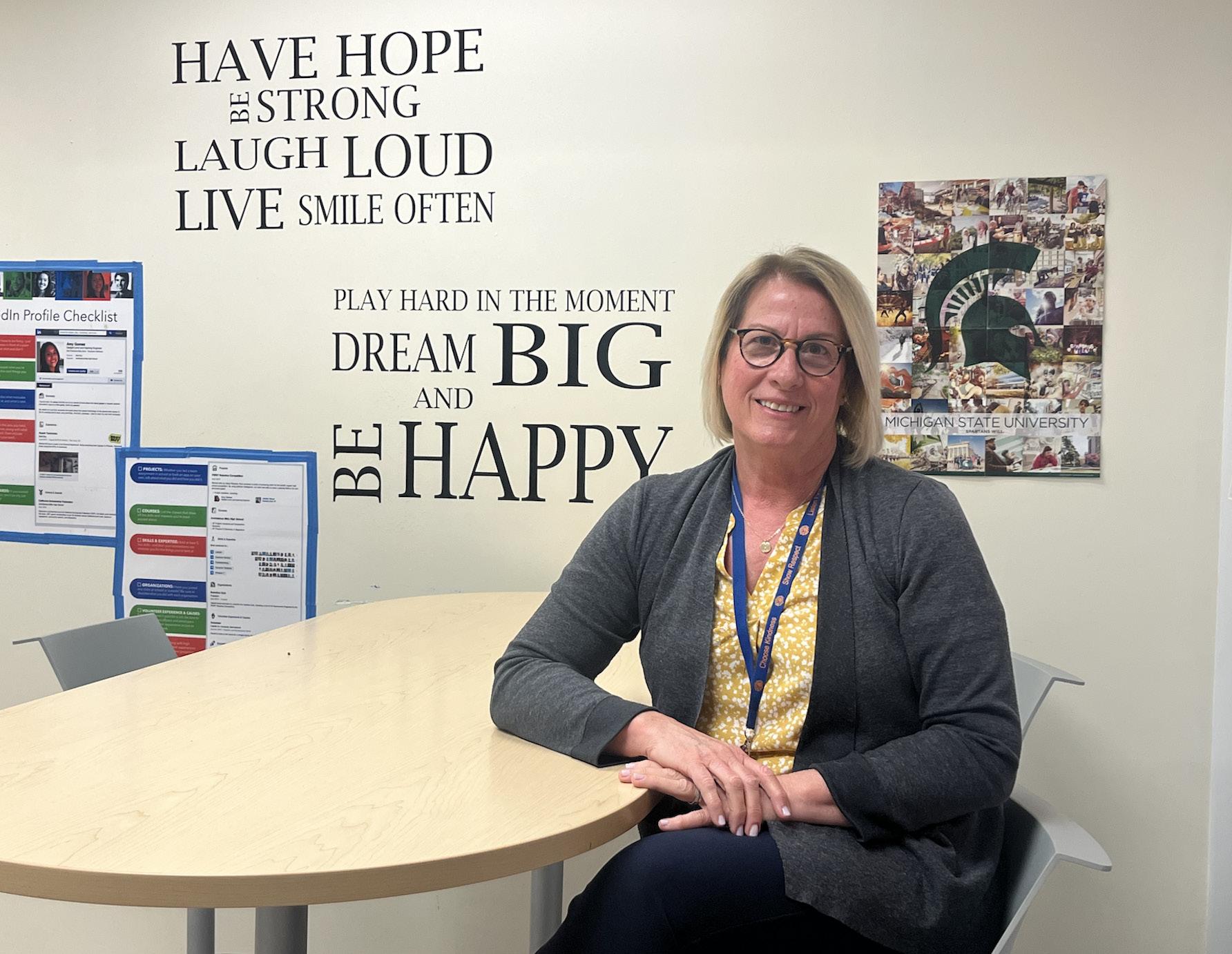
by Ellie Shim
On April 27, three Newton residents were selected at the MA Fourth Congressional District Caucus to serve as delegates at the Democratic National Convention (DNC) in Chicago later this summer.
To become a delegate in Massachusetts, one must submit both a petition and a statement of candidacy. 96 district-level delegates representing the state will go on to represent voters in the Democratic party at the DNC.
At conventions like the DNC, political leaders from across the country gather to discuss national issues before delegates cast votes to select the presidential nominee on behalf of the district they represent. A candidate must win a majority of delegate ballots to be chosen to run.
Newton delegate Sharon Stout said that she feels accomplished to be a part of such a critical process.
“Working up in politics and getting to the next level as a national delegate is your personal reward,” she said. “It’s a crown, a feather in your cap.”
Newton delegate and Nobles and Greenough school school senior Alan Cai said that he hopes to take his political involvement to the next level through the experience.
“I am looking forward to meeting people who are willing to listen to the needs and wants of our district,” he said. “It's so important that delegates serve as a voice for active communityparty connection, because [the country] is a very big place.”
Stout said she is eager to engage with difering perspectives at the DNC.
“It’s nice to network across the country where there are diferent issues, [and] diferent mindsets,” she said.
Cai said that he hopes to represent all groups within his diverse community, especially marginalized or quieter ones.
“I have a sense of responsibility going in front of [youth] who are like me and for my congressional district,” he said. “[I] hope to support them and voice their concerns.”
Former city councilor Holly Ryan is the
third Newton resident who will be at the DNC.
Connecticut delegate Sharon Dunning said that it is important for youth to get involved in politics.
“My frst recommendation is to participate in civic activities, to get involved in the board of education or city council,” she said.
Similarly, Cai said that it is critical for youth to keep in mind that their involvement in politics is a responsibility.
“It's not easy to be a high schooler and be involved in politics because people will talk down to you,” he said. “But you deserve to have

your opinions heard and be the change in the world that you seek.”
President of South’s High School Democrats chapter Bella Ishanyan said that youth ofer a unique perspective on politics.
“We haven’t been in this feld long enough to be discouraged from making a change,” she said. “Our minds are always going. We always
It's nice to network across the country where there are diferent issues, diferent mindsets.
Stout
have fresh ideas.”
History teacher Andrew Tompson said that it is important for youth to be involved in politics as it builds habit and responsibility within your civic duty.
“It's a right we shouldn't take for granted,” he said. “It's one of the few ways that we can exert some power.”
History teacher Michael Kozuch said that students must recognize their voice in politics and do more to take advantage of it.
“Your present and your future are up on the ballot,” he said. “Young people can do a lot beyond just voting.”
First Last Position Position
Remember to always match your body text up with the blue guidelines! Do not put text on the last line of the column!!!
I hopped of the plane at L.AX, with a dream and my cardigan. Welcome to the land of fame excess (woah). Am I gonna ft in? Jumped in the cab, here I am for the frst time, look to my right, and I see the Hollywood sign. Tis is all so crazy! Everybody seems so famous!
My tummy's turnin' and I'm feelin' kinda home sick. Too much pressure and I'm nervous – Tat's when the taxi man turned on the radio, and a Jay-Z song was on! And a Jay-Z song was on. And a Jay-Z song was on.
So I put my hands up, they're playing my song, the butterfies fy away. I'm noddin' my head like, yeah. Movin' my hips like, yeah. I got my hands up, they're playing my song, they know I'm gonna be okay. Yeah, it's a party in the U.S.A. Yeah, it's a party in the U.S.A.


Remember to always match your body text up with the blue guidelines! Do not put text on the last line of the the plane at L.AX, with a dream and my cardigan. Welcome to the land of fame excess (woah). Am I gonna ft in? Jumped in the cab, here I am for the frst time, look to my right, and I see the Hollywood sign. Tis is all so crazy! Everybody seems so famous! My tummy's turnin' and I'm feelin' kinda home sick. Too much pressure and I'm nervous – Tat's when the taxi man turned on the radio, and a Jay-Z song was on! And a Jay-Z song was on. And a Jay-Z song was on. So I put my hands up, they're playing my song, the butterfies fy away. I'm noddin' my head like, yeah. Movin' my hips like, yeah. I got my hands up, they're playing my song, they know I'm gonna be okay. Yeah, it's a party in the U.S.A. Yeah, it's a party in the U.S.A.

Last issue, on page fve, Te Roar mistakenly printed primary election statistics from Newton County, GA. We printed a correction in this issue. Tank you to Jim Truncer for kindly pointing this error out to us.
Tree issues ago, on Dec. 22, 2023, Te Roar published what was intended to be an informative piece online to accompany our print reporting on how the war in Gaza was afecting students at South. Te online piece included a few spelling errors and the omission of a major historical event.
Tank you to our readers who point our mistakes out to us. We hear you, and we appreciate the opportunity you provide for us to learn and grow.
However, when a reporter makes a mistake or writes something you disagree with, insulting, threatening or belittling them is never acceptable.
As an entirely student-run publication, all of our editors, writers, photographers and artists are students — students with responsibilities to our education, families, friends and community outside of our work on Te Roar
We are not professionals; we are people. Treat us with the respect and decency you would like to be treated with.
For our past errors, we sincerely apologize. It was not, and never has been, our intention to ofend, only to inform.
We understand that not everything that we are able to publish should be published. When covering controversial issues, we give ample consideration to the transparency of the writing and potential consequences after printing.
We always withhold anonymity as a last resort — only applicable if an interviewee’s
uphold the following values:
Accuracy — We pay painstaking attention to detail and verify our facts in all our reporting, writing and editing.
Brevity — Stories are written as concisely as possible.
Clarity — We write in precise, logical, clear language, and we design the paper so read-
Equipped with these eight values, Te Roar staf re-afrms our commitment to serving this community, and we hope to continue building a relationship of trust with those who read our reporting.
safety is at risk.
Te Roar receives no funding from the school or administration. All of our funding comes from advertisements; we do not have sponsors.
On May 21, Te Roar staf gathered to revise the ethical guidelines within our staf manual. After a discussion, we settled on eight principles to guide Te Roar from here on.
In all the writing, reporting, photography and presentation of Te Roar, we strive to
Te Lion’s Roar, founded in 1984, is the student newspaper of Newton South High School, acting as a public forum for student views and attitudes.
Te Lion’s Roar’s right to freedom of expression is protected by the Massachusetts Student Free Expression Law (Mass. Gen. Laws Ann. ch. 71, Section 82). All content decisions are made by student editors, and the content of Te Lion’s Roar in no way refects the ofcial policy of Newton South, its faculty, or its administration.
Editorials are the ofcial opinion of Te Lion’s Roar, while opinions and letters are the personal viewpoints of the writers and do not necessarily refect the opinion of Te Lion’s Roar. Te Lion’s Roar reserves the right to edit all submitted content, to reject advertising copy for resubmission of new copy that is deemed acceptable by student editors, and to make decisions regarding the submission of letters to the editors, which are welcomed.
Te Lion’s Roar is printed by Seacoast Newspapers and published every four weeks by Newton South students. All funding comes from advertisers and subscriptions.
In-school distribution of Te Lion’s Roar is free, but each copy of the paper shall cost one dollar for each copy more than ten (10) that is taken by any individual or by many individuals on behalf of a single individual. Violation of this policy shall constitute theft.

ers can easily understand the content.
Relevance — We strive to select the most important quotes, illustrations, anecdotes and facts. In our brainstorming process, we choose topics based on their timeliness, proximity, impact, oddity and human interest.
Attribution — All information and statements, except the most obvious, is attributed to the source of material. Sources are identifed by name and title whenever possible. Photographers, writers and artists are given
credit for all of their work.
Fairness and balance — We strive to give everyone with a stake in a story a chance to comment on it, and we treat sources without favoritism.
Objectivity — We use the same reporting and writing methods regardless of our personal feelings about an issue in an attempt to provide unbiased, clear information to readers.
Truth — Above all else, we strive to print the truth as best as we can ascertain it, and correct ourselves in the inevitable event we make an error.
By engaging in journalistic practices, we students learn to value objectivity, and critical thinking, and in doing so, we create a generation of discerning media consumers and ethical content creators who can identify and combat fake news and misinformation, especially in today's digital age.
Equipped with these eight values, Te Roar staf re-afrms our commitment to serving this community, and we hope to continue building a relationship of trust with those who read our reporting. In our following issues and volumes, we seek to better ourselves and our community through our work.
As always, Te Roar welcomes the opinions of our readers in the form of letters to the editor. Please direct them to ss.lionsroar@ gmail.com.
Newton South High School’s Student Newspaper
Editors-in-Chief
Grace Dempsey
Andrew Feinberg
News
Hana Futai
Jenny Lee
Ellie Shim
Risha Sinha
Managing Editors
Teo Younkin
Julia Lee
Alex Zakuta Centerfold
Irene González de las Casas
Ava Ransbotham
Features
Laura Feng
Sarah Schwartz
Bethesda Yeh
Photo Managers
Tayer Bialek
Tate Slater
Opinions
Max Hubbard
Jacob Lewis
Angela Tao
Grace Yang
Sports
Charlie Bluestein
Joey Giragos
Olivia Whitaker
Graphics Managers
Clare Cho
Lynn Kim
AJ Nguyen
Faculty Advisor
Ashley Chapman

I always listen to "Ave María" before I take a test.
As I walk through the hallways towards my class, I put in my AirPods and slip into the spellbinding realm of classical music.
I began the ritual after reading online that entering any testing environment calm, collected and focused would result in better performance on an assessment.
In my mind, there’s nothing more grounding than "Ave María", with its simple and inviting melody hovering above an enchanting, lush accompaniment, drawing the listener into an intimate and calming place of inner peace.
While Bach and Schubert arranged the better-known interpretations of this timeless classic, I’m inexplicably drawn to the version written by relatively unknown Icelandic doctor and composer Sigvaldi Kaldalóns in the early twentieth century.
It might have something to do with the simplistic, yet powerful, beauty of his composition, its melody a calming but equally captivating force, ringing with emotion.
I was frst introduced to the piece years ago by Icelandic pianist Víkingur Ólafsson, whose revolutionary transcription of Kaldalóns’ work for the piano shaped the way I view the world.
Recorded on the upright piano as op-
posed to the traditional studio grand, its slightly mufed notes and beautifully shaped phrases combine to form one strong musical idea.
What that musical idea was, exactly, I wasn’t quite sure of at the time. But as the recording stuck by my side through the fall and winter of my freshman year, guiding me through a maze of stress, tests, assignments and superfcial problems, I decided that, at its core, “Ave María” was about sadness.
And that’s true, in a way. Te work is
to soothe my lesser struggles: "Ave María".
"Ave María" permeated the days that followed, events a blur of loss and grief that swirl every so often in my memory when I hear the opening notes of the piece. "Ave María" was there during the excruciating plane ride to visit my relatives and the subsequent hours-long trek to my grandmother’s house.
Having made the trip only weeks before in entirely diferent circumstances, the journey felt surreal. "Ave María" was my beacon of light,
"Ave María" was my beacon of light, penetrating brilliantly through the darkest corners of my mind.
undoubtedly underscored by deep notes of loss, longing and profound sorrow. “It’s a song very often played at the darkest moments in our lives, to give hope and to bring light,” Ólafsson once remarked.
Unbeknownst to me at the time, the piece would take on an entirely new meaning in the months to come.
My grandfather died in the spring of 2023, and my world shattered. Having last visited him only days before, the news came as a complete shock. Lost, directionless and unsure of where to turn, I sought solace in what I knew


penetrating brilliantly through the darkest corners of my mind.
In the weeks after my grandfather’s death, I frst taught myself to play the piece. I would let the melody wash away my tears as I sat at the piano, struggling to cope with an exhaustive feeling I yearned to understand.
While the piece is unmistakably rooted in sorrow, what’s most fascinating to me about "Ave María" is that it’s written in a major mode. Unlike those written in the minor mode, rooted in darker, gloomier sounds — Beethoven’s famous Moonlight Sonata comes to mind —
pieces like "Ave María" are marked by bright, merry and joyful tones.
"Ave María"’s major mode is subtle and hard to notice at frst. Te piece opens gently, with waves of emotion brought to life on the instrument’s lower register, before the melody takes center stage, carrying the listener along on its gut-wrenching journey of grief, ringing resonantly with a deep sense of loss.
But as the piece descends from its peak of despair, it slows and nears its end, with one fnal, graceful chord ringing jubilantly, a triumph.
Te true message of "Ave María" is one of resilience.
It’s safe to say that my love for classical music extends far beyond "Ave María". Whether I’m fnishing a pile of homework to the rich instrumentals and exquisite operatic vocals of Mozart’s “Laudate Dominum” or beginning my day with the dramatic crescendos of Bach’s “Organ Sonata No. 4”, the genre is an integral part of not only my daily routine but my identity as a whole.
But to me, "Ave María" is far more than a simple work of classical music. It is my personal anthem, the soundtrack to my life.
It taught me how to be resilient, how to reclaim hope and how to be joyful again. It also happens to be the second most streamed song on my Spotify Wrapped.
As my world contorts, the piece sticks faithfully by my side through it all, no matter the circumstances.
"Ave María" will always be there.



“Do you have your license yet?”
It’s as if the minute you turn 16 — Massachusetts’ legal age minimum for driving — the aunts and uncles you see once a year swarm you with this question.
several urban minority neighborhoods viewed as “slums” were destroyed, at the decision of the federal government and under pressure from bordering white neighborhoods.
year to subsidize our roadways, regardless of whether or not they own a car.
accessible. But there is still work to do.
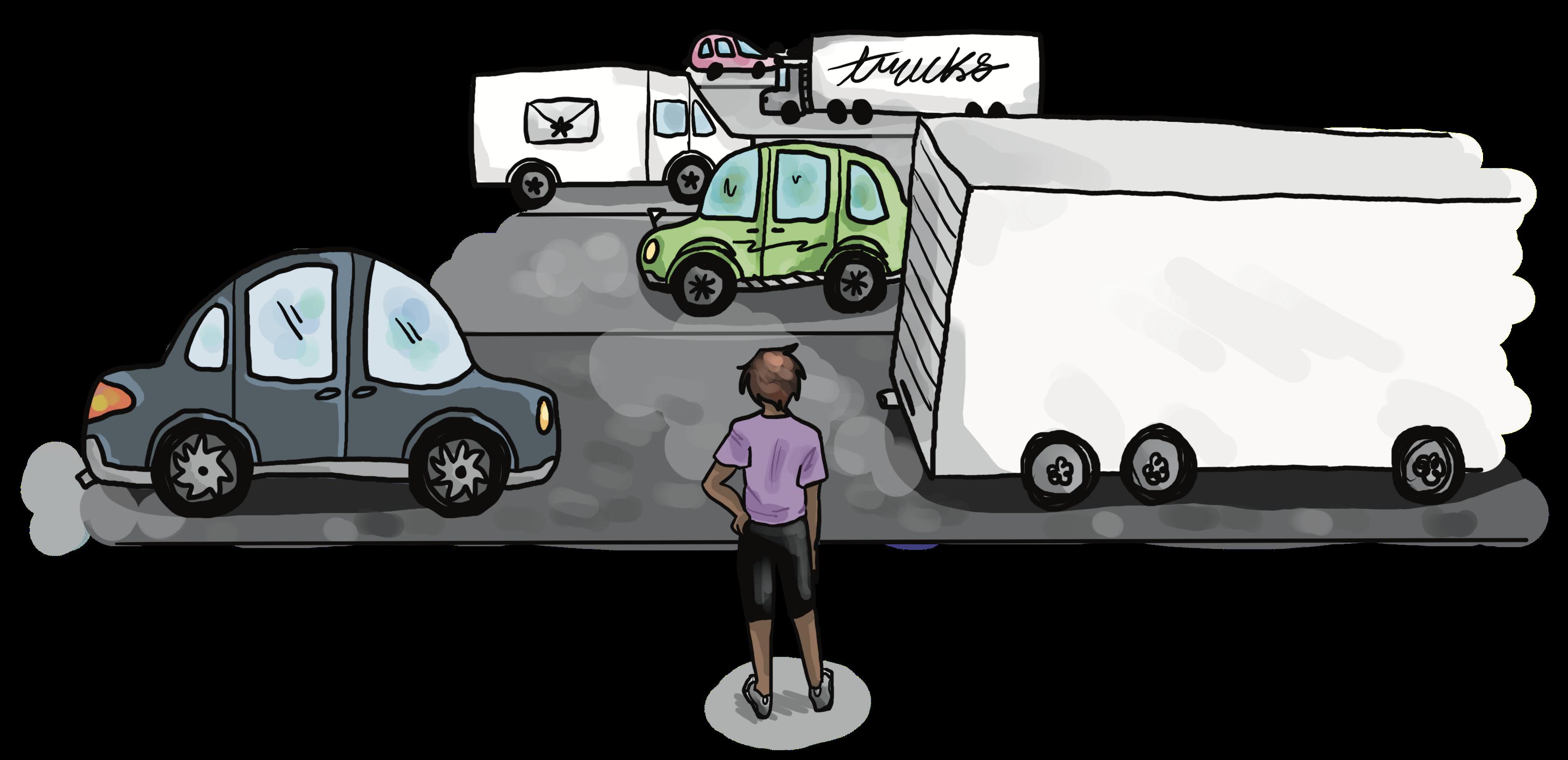
From driving school Zoom lessons to your frst parallel parking job, cars suddenly become the center of life milestones on everyone’s mind.
As more and more South students begin learning to drive in the spring, the armies of cars advance further and further up the streets of Greenwood and Olde Field — and I can’t get to class until 9:15 A.M.
Driving is hyped up for a reason: it’s fun, it’s freeing and most importantly, it allows you to get around places more easily than ever before. With over 160,000 miles of federal highway, the United States has the largest highway network on Earth.
Tese roadways criss-cross our vast landscapes and act as a lifeline for the economy and mobility of major American cities.
Boston’s I-95, Los Angeles’ I-5 and Atlanta’s I-75 are just a few examples of these heavily traveled interstates carrying hundreds of thousands of people to work daily, as well as enabling rapid transportation of ambulances and goods and supplies across the country.
Still, these roads are paved with prejudice. Many federally-funded interstates were constructed under the 1956 Federal-Aid Highway Act, coinciding with the legal enforcement of racial and housing segregation: consequently,
In Syracuse, New York, I-81 was constructed directly through the city’s Ward 15, which contained 90 percent of the city’s black population; in Miami, Florida, I-95 leveled the thriving community of Overton, labeled the “Harlem of the South”, and brought the population down from 40,000 to 8,000.
Here in Boston’s Dudley Square, fourishing businesses and properties were knocked down for two proposed freeways that never even got built. Families and businesses from all these formerly prosperous communities still bear the scars of these highways today.
It goes without saying that all the cars traveling our roads emit huge amounts of carbon dioxide into the atmosphere, further accelerating global warming by trapping more atmospheric heat.
In 2023, that amounted to over 30% of all the nation’s energy-related carbon dioxide emissions.
For this reason, many Americans may opt for electric vehicles like Teslas instead of traditional gas-burning vehicles; however, this temporary bandage on the car crisis isn’t a real solution. Increasing the walkability and bikeability of cities is.
Nearly 70 years after President Eisenhower’s Highway Act, we now live in a society
Imagine how much easier and cheaper it would be to build and pay for areas intended for people, not two-ton SUVs.
Fortunately, Newton has begun crucial steps towards this goal. In 2010, the City designated the 5.3 mile carriage lane on Commonwealth Ave as a bike and pedestrian lane, giving residents real options for travel to work and into boston. Likewise, heavily frequented train stations like Newton Highlands and Newton Centre allow people to commute without the use of a car.
More and more students are biking to school each year. Bike racks by Wheeler House increase the number of people who can do so, and school buses make group transport more
We elicit far more excitement for a new license than for a frst-time bike ride.
completely centered around the automobile. Our American cities aren’t flled with bustling small shops and streets, but instead parking lots and gas stations.
According to the Harvard Kennedy School of Public Policy, every Massachusetts family pays around 14,000 in tax dollars per
South lacks protected bike lanes and lights along Brandeis Road like what Newton North has on Walnut Street.
Biking on congested roads without any form of physical protection or delineation for bike travel is hazardous and makes biking unsafe for students.
Although these modes of transport provide alternative ways to get to school, the car remains overbearing in the South community. Many students are opting to drive themselves instead of taking the bus or biking — myself included. At the end of the day, it’s not just our infrastructure that is built around the car, it is our culture.
We propagate this hyper-focus, whether or not we intend to: we make driving a rite of passage, turn sports cars into status symbols and elicit far more excitement for a new license than for a frst-time bike ride.
In high school life, driving is considered one of the last gateways to maturity, more so than is productive or healthy for our community. I’d be lying if I said I didn’t subscribe to this belief, or that I wanted to abandon the automobile as a thing of the past.
But its position as the cornerstone of urban planning needs to shift, especially in a world that is inching towards a climate crisis and needs to mend the wounds of old divisions as soon as possible.
For just one person to make a change, it can be as simple as riding your bike to school on a sunny day.
Why do we frequently leave homework unfnished, convincing ourselves we’ll do it during canceled class an hour before it’s due, or actively avoid long-term assignments, putting of that paper until we’re forced to sit down and write it the night before the deadline?
Delaying work is something everybody has experienced in their high school career. Whether it’s doing chores or fnishing that important project due at midnight, this bad habit dies hard.
Procrastination, while broad in scope, can be roughly defned as the act of putting of a task until there is no logical reason for these duties to be delayed, typically leading to repercussions, ranging from a bad grade to internalized shame.
While getting a few points taken of a quiz isn’t grievous, procrastination can easily spin out of control, becoming a habit, coupled with perpetual disappointment.
Procrastination is frequently assumed to be synonymous with laziness; while it can be a byproduct of long-term procrastination, this statement is false.
Laziness occurs when a person no longer has the motivation to complete their respon sibilities, and ultimately no task is completed. Te main diference between laziness and procrastination is that while procrastinators fully intend to complete the task at hand and simply postpone it, so-called“lazy” people don’t feel the need to complete the task at all.
extenuating circumstances frst. If a person is unable, degrading their character to “lazy” is ofensive, especially without context.
As Devon Price explains ,“When people appear to lack motivation, it is because they are exhausted, traumatized, in need of support or do not see any logical incentive to take part in a
is lazy in itself.
McLean Hospital states that “the more anxiety we experience about a task, the more likely we'll put it of until later.” Tis laziness may also stem from deeper battles with depression and an overall need to rest from mental health issues.

crastination leads to the development of a habit. What started as procrastinating on homework results in decreased productivity in the long run, and bringing these habits to future workplaces will only lead to failure. Tis fear of failure is what causes people to turn to grind culture, where people assume that to be successful, they must work constantly.

We cannot presume that anyone can complete any given task without exploring the
lazy infames exhaustion and the lack of motivation from the pressure. Ironically, only recognizing the surface-level narrative and dismissing that person immediately
something makes you feel bad, so then you don’t want to do it.
Procrastinating to the point of laziness is a symptom of grind culture. Practicing pro-
A study conducted in 2022 by Deloitte and Workplace Intelligence revealed that an astounding 70 percent of C-level executives were seriously considering quitting their jobs to prioritize their mental health.
Overworking, fueled by toxic conditions, creates a competitive atmosphere where no one wants to be outperformed, sustaining the innate culture of one-upmanship.
Te University of Michigan found that it was “normal to hear about people studying instead of sleeping or studying through meals.” Tese conditions nurture “laziness” in the sense of burnout and lack of motivation. Grind culture evolves into procrastination; people don’t want to feel burnt out, yet the pressure ultimately outweighs their dedication. Everything needs moderation, and overworking is causing people to lose identity outside of work and school, rendering them helpless and exhausted.
Te word "lazy" is a misft, and judging someone’s well-being without knowing their circumstances is unfair. In actuality, laziness isn't real — it’s just the instinct to procrastinate and give yourself a rest.
Tere are two types of people in this world: those experiencing“brain rot,” enamored and encapsulated by Internet culture, and those who don’t know what it is. One thing that everyone can agree on, whether or not they know the slang, is that language is changing, for better or worse.
In the last 10 years, common phrases have turned into “yeet” and “sus”, while “dabbing” has evolved into “hitting the griddy.” Tese trends ebb and fow, reshaping the way we express ourselves.
From the emergence of Gen Z slang to the integration of colloquial language into tra ditional media trends, the ever-changing char acteristics of linguistics can risk undermining the fragile complexities of the English language.
Today, many believe that the Eng lish language, slang and speech pat terns are becoming lethargic, with mod

that aren't needed.
We’ve gotten lazy, which has caused words like “charisma” to turn to “rizz,” and “delusional” to turn to “delulu.”
Te rise of screens accessible to Gen Alpha has ushered in an era of unprecedented screen time. Tis increased exposure to digital devices has been linked to what some linguis tics experts refer to as "brain rot" or mental lethargy.
As individuals spend more time

engaging with screens, they tend to passively absorb information rather than actively process it. Tey pick up the quick and easy-to-use phrases and start incorporating them into their speech.
Despite the benefts of conversational shortcuts, from exposure



While many parents are quick to blame the infux of screen time for this impoliteness, responsibility cannot solely be placed on them.
Tere is a diference between how you talk to peers and parents. If the level of formality is not the same, the way you communicate should not be either.

In the past fve years, I have had multiple teachers lecture my classes on how to write an email. Tese lectures always emphasize that an email should not be written like a text and that to do so insinuates a lack of respect for authority.
Tis is not to say all slang is bad, but there is a time and a place for its use. Certain linguistic barriers are set for a reason and should not be broken.
Alarmingly, slang has become increasingly present in literature. Since people will most readily interpret media and literature that sounds conversational, that is what authors write.

While this incorporation of slang in modern literature makes books more attractive to those who wouldn't normally read for pleasure, it risks losing the authenticity of the English language.
Classic literature, like Charles Dickens’ “A Tale of Two Cities”, has lost popularity as language has changed, and they are often considered harder to read.
Language has always been fuid and adaptive, but we have to be cautious that the downsides to changing linguistics don’t start to outweigh the positives.
If you want to get that dream summer bod, you have to hit the gym. After all, this is the source of our dream guy’s chiseled jawline and eight-pack abs. Even the National Institute of Health agrees: a 2018 study found that athletes are generally perceived to be more attractive by society.
But before we pick up any weights, we must frst consult the opinion of our favorite ftness infuencers, for there is surely no other way to achieve those desired results without strictly following their glorifed regimens.
So, as we spend hours at home scrolling for motivation and a perfect workout routine, we realize we need more than a premium gym membership and a growth mindset.
We need cute workout clothes, protein powder and pre-workout drink mixes, all bought with an infuencer’s promo code and found on our most trustworthy app: TikTok.
It’s inherently difcult to resist falling down the rabbit hole of online shopping, for digital marketplaces promise results that look startlingly similar to our favorite infuencers with the dream body.
As adolescents who want to ft the norm, we’re extra vulnerable to the toxic mindset which encourages us to click, click, click and buy, buy, buy.
This mindset empties our wallets by claiming such products are necessary to achieve the ideal body, creating a dependency on materialism to attain a fgure fabricated by companies that stand to proft.
It’s a circle: workout products present

themselves as paths to the ultra-desired slim build, an existing point of inse curity for teens still not confdent in their bodies, leading to the establishment of a connection between said products and the perfect fgure.


Te concept of “a perfect bod” itself is a marketing ploy, designed to be unattainable to push us to keep purchasing products to remedy a fake problem that’s impossible to solve.
Of course, eating the right amount of calories is a must-do in achieving that sum mer body; lying on the couch licking sticky, orange Cheetos of your fngers is not how you are going to get bikini-ready.
But then, what should you be eating to achieve that impec cable body? Well, let’s turn to our most trusted and reliable source: TikTok.

As we take a glimpse at various slender bodies and self-proclaimed fve-star ftness infuencers’ sparse diets, we realize that we are eating all wrong: our lunch doesn’t look half as aesthetic as theirs.
We subsequently look toward cut ting out those guilt-ridden midnight snacks, or the afternoon binge of ice cream. While cultivating healthy eating habits is obviously imperative, following infuencers’ implicit and explicit advice to completely cut out fun food won’t help you eat healthier, rather, it will
“Ricky Stanicky,” a new flm set in Rhode Island during the mid-2000s, brings a fresh perspective to the comedy genre with its witty dialogue and engaging storyline. Directed by Peter Farrelly, it was released on March 7, 2024.
Te movie revolves around three childhood friends – Dean, Wes and JT – who create a fctional character named Ricky to conceal their wrongdoings and evade the consequences of their actions; however, upon getting caught red-handed, they have no choice but to reveal the truth.
“Ricky Stanicky” exceeded expectations. It was funny, sad, touching and entertainingly absurd. Although the plot is basic, its delivery is exceptional. Its craziest moments only added






kills it with his role as JT. His reactions alone often got a laugh, and although his character is one of the least developed, he is still a standout. Efron and Jermaine Fowler deliver solid performances as Dean and Wes, adding depth to the flm.
While there is admittedly a lot of crude adolescent humor, there are also a lot of clever jokes incorporated throughout, which the actors always deliver well. Te movie’s core message is that sometimes the habits we develop as kids can be detrimental in adulthood, and eventually need to be broken. Once you come to understand the movie’s underlying theme, it becomes much more interesting to watch, and more relatable as well.
 Andrew Santino
Andrew Santino
only make you crave those foods even more, leading to overeating and eventually destructive consumption habits.

According to a 2022 study done by the National Library of Medicine, 42 percent of youth on social media are reported to have eating disorders.

Ultimately, social media’s hyperfocus on diets leading many teenagers to develop eating disorders rather than a sustainable version of their dream summer body.
It’s an age-old, problematic, yet common ideology that a perfect, slim-toned, gym-made body equals hot, and that being skinny will always be associated with the
 graphic by Aleeza Amitan
graphic by Aleeza Amitan

So if infuencers’ workouts, diets and outfts promise us skinniness, are we pretty enough yet? When will we receive the pretty privilege-given relationship advantages?
We as a society seem to be stuck seeing people as worthy of love only if they resemble Bella Hadid or Jacob Elordi.
According to research done by the American Economic Association, people who are considered attractive (especially females) are likely to have better wages and acquire promotions. The Halo Effect, when people subconsciously associate conventionally attractive people with also having other positive traits, is unfortunately ubiquitous. e system used to gauge us is inherently wrong. Te only way to break free is to embrace the body you're in as perfect.

note. Don’t turn to lm if you’re looking for a dark, brooding drama, but if you’re looking for a break from movies with overtly heavy themes and just want a good laugh, “Ricky Stanicky” is a great choice for you.


Arecent photo exhibit at the Newton Free Library sparked both protest and support — a representation of the continuing efects of the war in Gaza on the Newton community.
On May 9, the library hosted a reception with over 300 people in attendance for a photography exhibit by Skip Schiel titled "Te Ongoing & Relentless Nakba: Te Palestinian Catastrophe of 1948 to Today," featuring 2018-2019 photos from the West Bank showing residents in their current homes and the homes they left in 1948.
In her email newsletter on May 1, Mayor Ruthanne Fuller said that while she anticipated the event would be ofensive to some, she backed the library’s reasoning for hosting it.
“I believe this exhibit will be quite hurtful and divisive, [but] I support Library Director Jill Mercurio to allow this exhibit to move forward in accordance with our Library’s role in Newton of providing intellectual freedom and freedom of speech,” she said.
In preparation for the event, the Newton Police closed the library at 6 p.m. Chief John Carmichael said that these precautionary measures were designed to protect attendees’ safety.
“Tere's a lot of emotion that's involved in all of this, so we want to make sure that people can freely express themselves,” he said.
“We would have to quell violent behavior from happening. We want everybody to feel safe that they can express themselves
Just because you're uncomfortable does not mean that you have a right to be comfortable at all times.
Uncomfortability invites introspection, it invites meditation, and it invites more progressive thinking.
no matter what their opinion is, no matter what other opposing opinions are. Tat's really why we're here.”
Protestor and Newton resident Miriam Kosowsky set up posters of maps and news clippings in the gallery hall next to Schiel’s photos. She said that the timing of the exhibit, although planned in July 2023, was inappropriate.
“Tis is absolutely the wrong time to bring an exhibit to this community, which is predominantly Jewish,” she said. “I'm here because although these are beautiful pictures, the name of the exhibit is extremely inaccurate and ofensive as is the description of what happened.”
Danna*, a former Newton Public Schools student and Boston College (BC) alum, said she and her friends attended to show support for Newton’s Arab population.
“I’m Palestinian, and I just want to support the photographer, as well as the Arab and Muslim community in Newton and in the surrounding areas,” she said.“We are a minority here, and I think we've kind of been drowned out.”
Danna said that while she understands diferent groups have their own lived truths, Schiel’s photographs represent reality for many Palestinians.
“Te reality is that a lot of people have just sufered on both sides, but also what is real is that there is and has been an occupation that has subjected thousands to displacement, detainment and death,” she said.
In contrast, Kosowsky said that the narrative presented by the photographs is fundamentally fawed because it contradicts history. She also said that students, especially, need to be aware of the nuances of the confict.
“Both narratives cannot exist because one is the truth and one is not. Tis [event] is leading to anti-Semitism,” she said. “[Students] should understand that especially when it comes to the Middle East, it is so incredibly complex that if they're not given the complexity, then they're not given the truth.”
MA Teachers Association (MTA) union member Joe Herosy said that he attended as a representative of “MTA for Palestine,” an informal group calling for a ceasefre in Gaza.
Tere’s people in Newton who are asking for people to
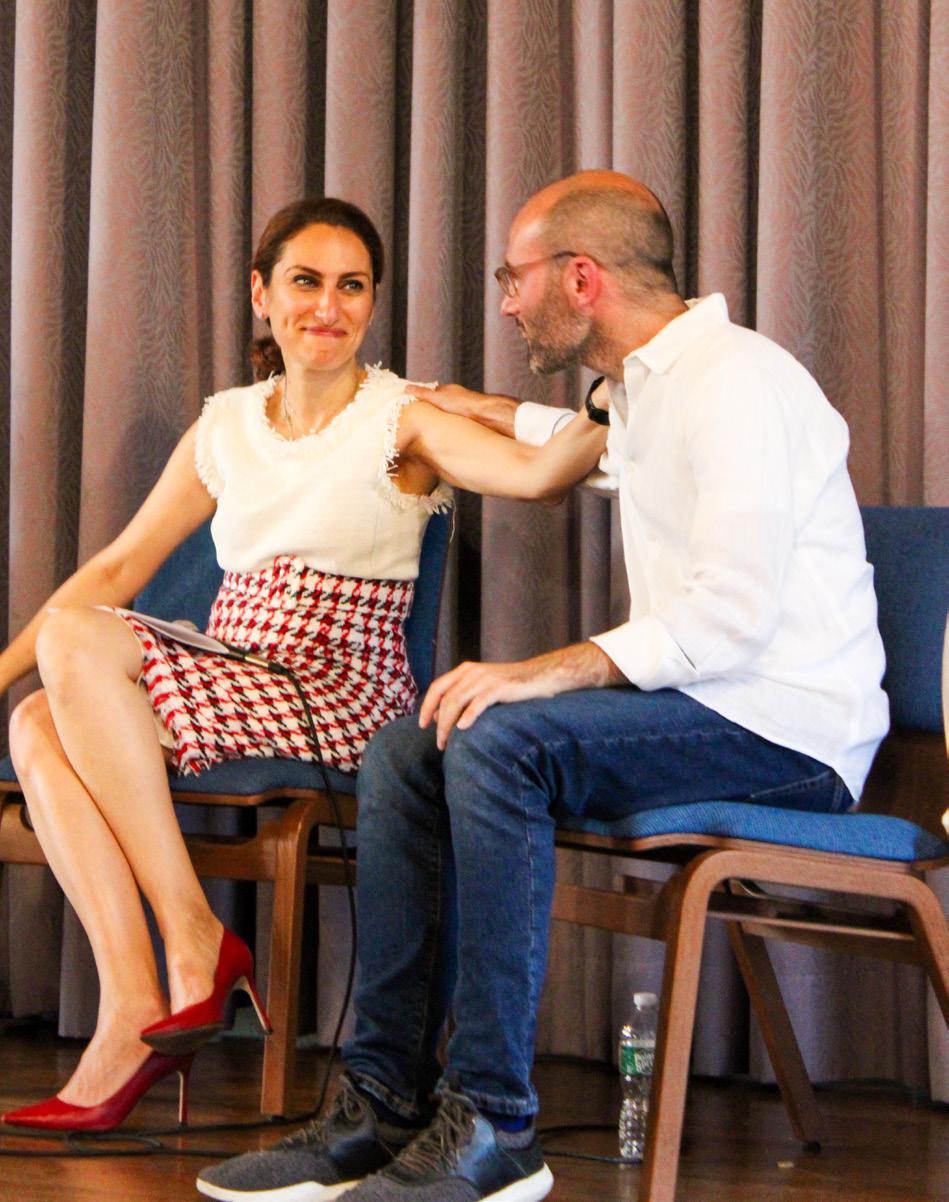
Speakers Ben-Aharon and
embrace at a panel promoting civil discourse when discussing the war in Gaza held two weeks after the library event and protest.
come out to support. I'm from Quincy, so I drove out just so it wouldn't be dominated by people who are against Palestinians,” he said.
Leader of the Jewish Leadership Project and author Charles Jacobs said he and members of his group were in attendance to express their distress and to oppose the speaker.
“I'm here because the whole Jewish community is terribly upset with the surge of anti-Semitism around the country,” he said. “We want to talk to as many people as we can and we want to challenge the speaker. We don't want him to get away with saying these horrible things.”
Former South parent Nathan Philips said a grassroots group of parents attended as “de-escalators” to try to facilitate a dialogue between opposing groups.
“We're here to do what we can to keep people safe, to help promote that it's a peaceful event, that the event is able to happen, and that people are able to manage their emotions to keep everyone safe,” he said.
Once the event began, protesters began shouting and singing over the speakers. Unable to be heard, Schiel and the event organizers moved out of the building to the adjacent streetlight across the street in front of City Hall. Protesters remained along the sidewalk of the library parking lot.
Two weeks later, on May 23, an invite-only event titled “Palestinian-Israeli Friendship: A Path Forward” was hosted at Grace Episcopal Church. Rabbis, Imams, City Councilors and Newton residents listened to a conversation between Guy Ben-Aharon and Dr. Eman Ansari about the ongoing confict and the trauma present in the Newton community, moderated by WBUR’s Tiziana Dearing, a former South parent.
Nate*, a BC student who attended both events, said that these types of difcult dialogues spark progress.
“Just because you're uncomfortable does not mean that you have a right to be comfortable at all times,” he said. “Uncomfortability invites introspection, it invites meditation, and it invites more progressive thinking.”
*Interviewee chose not to disclose their last name for safety concerns
When an UberEats driver approached sophomore Sofa Maklin and asked her to get in his car, she didn’t think anything of it and did as he requested.
On May 9, Maklin’s Spanish teacher took her class outside when a man wandered over to the group. Maklin, fuent in Russian, said she empathized with the recent immigrant from Azerbaijan who needed help fnding the front of the school but spoke little English.
“He was an UberEats delivery driver. He was holding this massive bag of McDonald's. And he started talking to me,” she said. “He was like, ‘Oh my God, hi, fnally somebody who speaks Russian.’”
Maklin pointed him in the right direction, but she said he was still confused about where to go and asked if she would come with him in his car to show him the way.
“I had a little bit of a lapse in judgment,” she said. “I got into this guy's car, and he drove me just from the 6000s to the front of the school. It was 30 seconds.”
Tey arrived at the front and the driver got out, but Maklin said she stayed in the car as he ran to put the order down on the table.
“Te feeling that I probably shouldn’t
said.
He returned to the vehicle and — still sitting in the car at the front of the school — Maklin said he told her that she was the most beautiful girl he’d seen in his two months in the United States.
“At that point, I was genuinely really uncomfortable,” she said. “In Russian culture, it’s fne to say that, it's not weird, but it was starting to feel weird.”
Maklin said he was interested in continuing their conversation and asked for her phone number to communicate further, and so she could help him with his English.
“I was starting to feel bad for this guy because he didn't speak any English — imagine how hard that is — but not bad enough to give him my phone number,” she said.
After a few back and forths, the driver insisting that they keep in contact and Maklin denying him, Maklin said she demanded that he drop her back of with her class.
“I got really, really mad at him. I told him I was going to make something very bad happen to him if he didn't drop me of right then,” she said. “He then dropped me of and he asked if we could please keep talking. And I said no.”
She thanked him for the ride and
According to the business information platform Business of Apps, from its popularization in 2017 to 2023, UberEats’ annual revenue increased from $0.6 billion to $12.1 billion. Stories like Maklin’s demonstrate how this evolution has afected student safety at South.
Students and staf alike have noticed an increase in online food ordering in the past couple of years at South. Junior Keith Isaza Zapata said its normalization can add a new stressor for students, especially those with low income.
“I do think there is pressure to order,” they said. “So many people buying food from outside sources makes you want to buy more,

some from a safety perspective.
“As a society we've normalized it, but looking at it from a bigger picture it’s terrifying,” she said. “Why are we letting random people come this close to the school?”
However, Isaza Zapata said that they believe that most delivery drivers do not have any underlying malintent.
“When you take up a job like that, it's because you really need the money, and you wouldn't really think of doing harm to people that are buying stuf. Tey're the ones paying your salary,” they said. “You don't want to jeopardize that job that you have.”
Principal Tamara Stras said that although the drivers are a nuisance and a potential safety risk, she said she recognizes that students don’t often have a good alternative.

Being sheltered is a privilege. Being in this community that is very wealthy really gives you that privilege of feeling safe every year.
campus provides.
“At my old school, there were security guards at every door, and the doors were always locked,” she said. “But here it's super nice that we have an open campus because it's really convenient. It reminds me more of college and how you have that independence to do what you want.”
Compared to the experiences she had at her previous school, Lee said that she doesn't think her safety is jeopardized at South despite its lenient campus restrictions.
you to the outside.”
Maklin said that her sense of separation from “the outside” induced her choice to get into the UberEats driver’s car.
“Here at South, I have more freedom, but the feeling of safety is about the same,” she said.
Keith Isaza Zapata class of '25
it is a good option for South students who don’t have restaurants nearby like North, where Colella went to school.
“As a police ofcer, I’m okay with it. As long as they are not getting in the building, and the school is fne with it, then I'm fne with it,” he said. “Especially since the students like it.”
Cutler dean Ted Dalicandro said that South’s online food ordering culture is enabled by its open campus policy.
“It's a luxury for students to have — it's an unnecessary one — but because we are an open campus, if students want to order food, right now our policy is, they're able to order food,” he said.
According to a National Institutes of Health (NIH) survey, 37 percent of high schoolers nationwide have some sort of opencampus policy. Tese policies range from late arrival and early dismissal for only select seniors to open lunch periods to a fully open campus for grades ten through twelve, like at South.
Despite never being a part of an open campus school before South, Stras said that she has seen it manifest positively at South.
“Most people don't have that concept of open campus. It took some getting used to having kids have access to leave and come back,” she said. “What is very impressive to me is the level of maturity that the kids have here because of it. I don't think that they abuse open campus.”
However, senior Adair Smyth said that the outpouring of student drivers taking advantage of open campus during their free periods can be frightening.
“It's dangerous having a lot of kids out on the road,” she said. “General teenage drivers are kind of scary to be around, but it’s especially bad under the lunch hour time crunch.”
Dalicondro said that to prioritize school safety, students should have a better under standing of the responsibility that comes with the privilege of open campus.
“I want kids to come in, I want them to learn. I want them to feel comfortable here and be as safe as they can in their learning environ ment, and with open campus you worry about that bad phone call or God forbid something happened,” he said.
In order to minimize that risk, Dali condro said the open campus system needs to be reassessed.
“Open campus should be moved more to a privilege, where you need a certain GPA, and you need to be a good school citizen, and then you can handle the campus.”

As someone who lives outside of Newton, Isaza Zapata said they recognize that the privilege that exists at South can create a sheltered environment.
“Newton is a bubble. I don't feel like people understand that you really don't have the same resources when you live outside of Newton,” they said.“If a city has more wealth, it's able to fnance better safety programs, police and better law enforcement, which all contribute to making a bubble. Tere's so much safety here
“Being in the school environment really gave me confdence to make the decision of helping him. If some random person approached me on the street, I would absolutely not get into their car,” she said. “Te fact that we're being sheltered from real things that are happening to real people gives everyone a misconception of safety because that's not how life is. You can't just assume that you're going to have that protection.”
Maklin said this misconception of safety produced by the afuence of the South community is a major drawback of open campus policy.
“While at school, I still have the efects and the infuence of that South-bubble on me, so I wasn't able to make a rational choice,” she said. “Tat's also something that's not good about letting kids make their own open campus choices.”
Although Maklin views the bubble negatively, Isaza Zapata said that they see its positives.
“Being sheltered is a privilege. Being in this community that is very wealthy really gives you that privilege of feeling safe every year,” they said.
Soph - omore and Brazilian exchange student Pedro Guimaraes said

Newton’s interpersonal culture makes open campus safer.
“Everyone is aware, and looking after each other here. If someone does something wrong, they know something's going to happen to them,” he said. “In Brazil, no one really cares. For example, you can steal someone and no one will do anything.”
Although an open campus has its drawbacks, Collela said that it can give sheltered students the opportunity to practice real-life skills that could prevent lapses in judgment and rash decisions like Maklin’s.
“It's great for the kids to learn responsibility in that way … No one's going to be holding your hand your whole life,” he said. “It's important for young people to learn accountability and freedom.”







Water guns take over South as seniors participate in one of the most beloved, yet cut-throat traditionsBy Emily Wang & Jessica Zhu
Amid the challenges of AP season, South seniors could be spotted after school armed with water guns, ready to drench their peers at a moment’s notice.
Tis long-standing tradition, dubbed Senior Assassins, has become a spring mainstay of South’s culture.
Starting in late April, participating seniors were given a target and tasked with eliminating them within the following four days. Taking place outside of school hours, the game consisted of four rounds.
While approximately 200 seniors entered the competition, the participants were whittled down to a fnal three by the last round,
“Tis one girl thought that I was a guy that was just lurking there,” she said. “It was really funny, but she was like ‘Yeah, I thought
“As I was pulling out of my driveway and turned around, I see this guy crouching behind the car in front of my street,
the game’s schedule clashes with seniors’ many commitments.

to bond the grade together,” she said. “Te great thing about it is that it's not school-sanctioned. It’s just the kids running it, and that's what I think a lot of high school students need.”
Senior Allison Wu said that the process leading up to eliminating her target was the most memorable aspect of the game.
“A lot of it is going with your friends and making a plan the night before, being like,‘we're going to meet at fve in the morning and we're going to camp out,’” she said.
As captain of South’s track team, Lirio regularly helps her teammates with workouts.
She said that the disguise she wore to avoid her assassin unintentionally created misunderstandings among her teammates.
Extreme measures taken during
wracking experience because you walk out of your house and you're waiting for someone to come up and squirt you with water,” he said.
Similar to Van Beever, Wu said that she also experienced many of the same worries frsthand, narrowly avoiding elimination as she left her house.
While Senior Assassins fosters excitement within the senior class, some feel that it can distract some

ment the game requires, English teacher Matthew Wilson said the event impacts

“I will occasionally get someone who comes late to class because they were trying to get their target early in the morning and losing track of the time, or [they] are in the middle of their senior slump,” he said.
Additionally, senior Abby Shin said that despite the enjoyment of participating,
“I don't think the timing is amazing because it's during AP season,” she said. “It definitely added a stress factor to an already stressful one. Tat's why I ended up getting out.”
Yang said the lack of restrictions on where participants lived was the game’s main challenge.
“A rule that I kind of wish was in place is you have to live within Newton to participate,” he said.
“Tat's partly because I know a few friends who got targets who were living in really out-of-place areas that are hard to get to, so essentially if you get them as a target, you’re at a signifcant disadvantage in the game.”
However, not everyone agrees. Senior Anastasia Senfuma said that no matter where people live, they should still have a chance to be a part of the event.
“You can't control where you live. Just because someone lives far, doesn't mean that they shouldn't play,” she said. “Tis makes it more challenging [and] more fun.”
When such issues arose, Senior Assassins coordinator and senior Ellie Jolly was responsible for making the fnal call.
She said that part of her responsibilities included being consistently available to respond to the plethora of messages she received.
“I woke up to calls and texts and all that kind of stuf, which is defnitely stressful to deal with, but it's been really fun,” she said.
Regardless of the nerves that deter some potential competitors, Jolly said she encourages underclassmen to participate when the time comes.
“Do it. Worst case scenario, you don't move on past round one, but knowing that you’re a part of it is a good feeling,” she said.
Andrew Petrilla features reporter
With the growing impacts of climate change threatening the future, sustainability initiatives are at the forefront of many students’ minds.
South’s Earth Day event, which took place on April 12, exemplifed the work South students do to help the school become greener.
Organized by history teacher Michael Kozuch’s senior sustainability class as an endof-year project, the event brought together speakers, games, interactive activities, art exhibitions and booths from professional and student organizations, all centered around Earth Day and climate awareness.
After months of planning and outreach, the event hosted more than 500 guests.
Senior and event organizer Sara Tomas said that the event sought to spark action from students and climate groups at South.
“Te issue is that [South is] environmentally conscious, but maybe not environmentally friendly,” she said.
Despite ongoing eforts to make South more environmentally friendly, senior and event organizer Liam Sakakeeny said that many people believe that the community still has a long way to go.
“We have a lot of work to do,” he said. “I think everybody else does, but we should make that change starting with us.”
Te event also aimed to educate younger students about the environment. Organizers coordinated with Brown Middle School, bringing more than 200 sixth graders to the event.
Richard Allsbrook, a sixth grade social studies and geography teacher at Brown Middle School, helped bring middle school students.
Allsbrook said that he wanted the high school students' activism to inspire his students.
“One of the things that I was hoping students would get out of this is seeing other students at a fair sharing information and seeing themselves in that role,” he said.
Kozuch supported the event to let his students turn the knowledge they accumulated over the year into a tangible product. He said that the event was everything he had hoped for and more.
“I was extremely impressed with the students and what they did,” he said.“I've never seen
anything like this. Tey were on board [and] went above and beyond my expectations for what would happen, and they're just amazing.”
Te event organizers are also part of the student-run Sustainability Squad initiative at South, which aims to make South more environmentally friendly and sustainable by educating students.
Senior Haley Kim, a member of Sustainability Squad and one of the event organizers, was inspired to do a fair after she saw sustainability groups at the Newton Harvest Fair last fall. She said she connected with the community aspect of the event.
“If a bunch of individuals come together and decide to make small choices … just to make

Change is easier than what it looks like. If you manage to group up with other people, then you can actually cause an impact.
Mateo Berger Oyola class of '24
their lifestyle a little bit better, in the end, that will pay of,” she said.
Earth Day is not a tradition at South; however, after this year, many hope it will become an annual event. Te event was largely organized by seniors, but they hope that underclassmen will take charge in the future.
Sakakeeny said that organizers logged much of their work to make it easier for future students and climate advocates at South.
“Next year, if they try to host an event again, they already have some of the work cut out for them,” he said. “It's just a matter of whether or not kids are excited and willing to put in the work to host the event.”
While it can be daunting to try to tackle an issue as broad as climate change, senior and event organizer Mateo Berger Oyola said that he hopes the event will show students that they can achieve anything they put their minds to.
“Change is easier than what it looks like,” he said. “If you manage to group up with other people, then you can actually cause an impact.”
who need someone who is not their parent or guardian to bounce ideas o run ideas by.”
A typical morning at South is often marked by a friendly greeting from Goldrick House’s beloved dean, Marc Banks.
However, obscured by the iconic grin is his tireless efort to work with students, parents and colleagues to strengthen the South community, a mission refected by his charismatic presence.
Banks said that as he goes about the school day, some of the many things he keeps in mind are South's four core values: choose kindness, take responsibility, listen frst and show respect.
“I try to the best of my ability to embody those four core values and personify and bring [them] to life,” he said.
As the dean of Goldrick House, Banks said that he has a wide range of responsibilities to fulfll.
“Te deans wear many hats,” he said. Te role of the dean is to be a supporter, but also provide guardrails and discipline for those who need it, and also just be there for students
I'd say the students keep me coming every day. Tere is never a dull moment in this position. I blink my eyes
and it's 3:45.
Banks' administrative position makes him responsible for disciplin ing students and often forces him into difcult situations.
However, freshman London Edwards said that Banks never fails to remain patient and supportive.
“He makes South a better place by showing that he cares about students and that he’s always there,” she said. “I know if I needed him for anything he would help me through it.”
Banks not only makes his students feel supported, but also empowered.
Senior Nate Scharf said while much of Banks' reputation centers around his friendly greetings, Banks is also incredibly helpful in serious situations.
“[Dr.] Banks sees us as full people who deserve to be listened to and have our opinions weighed,” he said. “He is very helpful when you have an issue… because he has the power to solve it, but he is also respectful and empathetic when trying to help you solve that problem.”
As a dean, Banks works closely with other teachers, includ ing English teacher Kelli Fitzgerald.
She said that it’s not only students who feel heard and validated by Banks.
“Even though I technically don't have as much

agency or power as he does in the building, I have always felt that he has heard what I wanted to say,” she said.
A self-described advocate for students, Banks said he strives to learn as many of his students’ names as possible, so that he can build a better connection before working with them cult situations.
“I say to Goldrick House [students] that if I don't know you by the time you graduate, I'm going to buy you a car because that has always been how I operate this house,” he said.“It's all about getting to know people and forming relationships.”
One of the many unique aspects of being a dean is the opportunity to work with students for all four years of their high school career.
Banks said that witnessing students grow is one of his favorite parts of the job.
“When you’re a teacher, unless you're lucky enough to have a student a second time, you get a student for one academic year and that's it,” he said. “But as a dean, I get to see you from your rst day of ninth grade till your last day of twelfth grade.”
Goodwin House dean Caitlin Brown said that Banks’ great work benefts not only his students but everyone at South.
“He is a very thoughtful man who really thinks things through and is always looking to create systems that are going
He
refects everything that we want our students to be and brings joy to everybody that he interacts with.
Ted Dalicandro Cutler House dean
to work best for the whole South community,” she said.
As Banks’ mentee, Cutler House dean Ted Dalicandro said that he admires everything Banks brings to the table, both as an administrator and as a person.
“He brings a positive energy that resonates through the whole school,” he said. “He refects everything that we want our students to be and brings joy to everybody that he interacts with.”
Fitzgerald said that it’s the minor choices Banks makes every day that lead to major improvements at South.
“His spirit makes [South] better,” she said. “It’s the speed with which he walks down the hall. It's his suits. It's the fact that he is always wearing blorange on Fridays. It's the fact that he is just ready to show up and be a very actively visible part of our school community. Tat's what makes all the diference in the world.”
At the end of the day, Banks said that he enjoys being a dean and couldn’t imagine working anywhere but South.
“I love this job. I'd say the students keep me coming every day,” he said. “Tere is never a dull moment in this position. I blink my eyes and it's 3:45.”

For the first time in six years, North and South's joint robotics team reached
the
final
stage of the FIRST Robotics CompetitionBy Katy Krintzman
Clad in safety glasses and brightly colored tie-dye shirts, the LigerBots, North and South’s joint robotics team, few to Houston to compete in the annual For Inspiration and Recognition of Science and Technology (FIRST) robotics world championship this spring. Te trip, which took place from April 17 to 20, marked their frst time qualifying for the event in six years.
Te team was given six to eight weeks to prepare an entry and tasked with the objective of building and programming a robot to complete several tasks, all while navigating a feld lined with other entries. However, while this year’s journey to the competition came with a handful of extra challenges, the team’s perseverance enabled them to work through the setbacks.
Sophomore Emily Perman, who works on the construction team and helps drive the robot through the course, said the team successfully came together during the strike to continue working on their robot despite many obstacles.
“We were able to make some progress even through the strike, so the fact that we got a working robot on the feld by our frst competition just shows the hard work and dedication of the members on our team and our coaches,” she said. “We spent countless late nights working on [the robot], and honestly the robot this year is one of the best we’ve ever produced.”
After the strike, and not originally qualifying for the competition, the team was excited to learn that they made the cut just days before it began.
Junior and Chief Operating O fcer (COO) Charlotte Storey said that she was grateful to have the opportunity to compete.
“We [were] on a waitlist, so we weren't sure whether or not we'd be able to make it. So it was really hectic from that perspective, but I think just the fact that we didn't know made everyone that much more excited to be there,” she said.
Junior Yonatan Tevet-Markelevich, the team’s co-COO, said their 20 mentors, who assist with various aspects of the completion and construction of the robot, are vital to the team’s consistent growth and improvement.
“Over the past three years that I've been on the team, we've done a little bit better every year,” he said.“We've been able to work with our 20 mentors to learn and they've been able to teach us and show us lots of diferent strategies, diferent ways to build a robot.”
While the competition remains centered around the construction of the robot itself, coach and mentor Chuck Tanowitz said that many of its aspects extend far beyond the fnal product.
“You're rewarded for outreach events, when you're interacting with your community and the change you're making in the world around STEAM education,” he said. “Tis team, for the past couple of years, has been remarkably active in outreach events.”
Junior Wes Halliwell, leader of the electrical team and technician, said he appreciates
We spent countless late nights working on this, and honestly the robot this year is one of the best we’ve ever produced.
Emily Perman class of '26
the team’s involvement in the community and the real-life skills that he has gained from being a member.
“Getting experience working in something that's in a lot of ways really similar to a small company, that's really valuable,” he said.
Te team’s determination ultimately earned them a spot in the World Championship. Junior and Chief Technology Ofcer Julia Hulburd said that the enormous crowds and long roster of teams competing from across the globe made the event truly unique.
“It was massive. Tere were over 600 teams worldwide, which was pretty crazy,” she said. “It was amazing to be able to walk around the corner and see these teams that you had only heard about online or seen from YouTube.”
At the end of the competition, the team received the Engineering Award, worth the second most points overall. After working hard, and winning this award, Perman said
that they proved the worth of their team and robot, despite facing initial challenges.
“Tere's no words to describe how proud I am,” she said. “We really proved that we are a team to be reckoned with — top-tier.”
Head coach John Fitzgerald, who is in his 16th season as head coach, said he attributes this year’s success to the team’s collaborative and kind environment; the cooperation within competition.
“Tere's a lot of cooperation in the pits,” he said. “People are helping each other, fxing other people's problems even though you know that you could be against them in your next match because no nobody wants to win because the robot on the other team broke down.”
Even after the competition draws to a close, the team remains involved in a number of of-season activities. Perman said that while many write of the team as solely roboticsdriven, its impact is far-reaching and takes a variety of forms.
“We do birthday parties, we do science fairs, we go to elementary schools and talk to teams,” she said. “I just recommend to anyone, look at our Instagram, look at our website, see what we do before you judge the people on the






Tere’s a scene I like from a 2001 Malcolm in the Middle episode where Reese, the amoral and conniving next-oldest brother in the family (they’re all amoral and conniving), tampers with the dishes of his cooking classmates so that he can win the best-cook award—which cause his parents, Hal and Lois, to worry that Reese lacks empathy, which, well…he does. When Hal explains to Resse that “if you hurt someone, empathy makes you hurt as well,” Reese replies quizzically, “Ten why would you want empathy?” Which kind of makes sense: Why would you want empathy? It’s exhausting to care about other people’s feelings and experiences; it takes enough efort to care about your own.
On Tursday, May 23rd, the South Human Rights Council sponsored a Walk for Unity rally to, in the organizers’ words, “lift up student voices, support one another, celebrate all that binds us together.” Student speakers from both South and our two neighbor middle schools shared thoughts about the benefts of afnity groups and inclusivity and of acknowledging, even announcing, our personal biases—all to the beneft of expanding our understanding of others and ourselves. Not too far away was an issue in the news and at home, the current Israel–Hamas War with its companion college campus protests, that has challenged allegiances and friendships and that has sent members of our South community into various safe corners, making open sharing of opinions harder to do than usual.
Competing empathies are especially tough to reconcile since people’s heartfelt connections with one group arouse anger at the behavior of another group, with whom others also have heartfelt connections. So it’s not that people aren’t practicing empathy; it’s that it’s multi-directional—so many different constituencies need it. Celebrating“all that binds us together” can do something to signal a willingness to listen to and trust one another, which is of course the doorway into a healthy community.
Within the confict of angry supporters, there is a selfsh reason that empathy is worth our time. It’s a downpayment on having the right to ask others to listen to us, even forgive us. Practicing empathy for others—both around the world and around the corner—gives us a more reasonable claim to ask for it from others. Empathy is transactional.
But a unilateral approach to empathy—practicing it without any promise of payment—is the more important reason it’s worth our time. Empathy is its own good: among the greatest oferings you can make to our human experiment. You contribute, you engage, you play your part by sprinkling in one of the principal ingredients for what makes this school, town, nation and world a better place, right up there with integrity, respect and kindness.
Where does this put all of us, heading into the summer and then the fall? Next, when you have time, agree with Reese for a moment: empathy is hard and sometimes very hard. Say,“Empathy shmempathy. Who needs it!” Ten get to work and agree with the Walk for Unity organizers: “Lift up student voices, support one another, celebrate all that binds us together.” Go Lions.


Lion's Roar asked... What would your ideal summer vacation be?

I’d spend my summer in NYC with my family. I love exploring the city! It’s super nice that you can walk everywhere, and it’s enjoyable because of the nice summer weather.
[I would stay] somewhere warm for a long time where I can swim a bunch and I don’t have to think about anything. I can just chill, completely.
[I'd want] a mix of relaxation and work. It’s important to get a break from school and chill over the summer... [but] it’s important to have something that activates your mind.
The Roar follows four seniors with different interests as they navigate the college application process. Their identities will be revealed as they make their decisions
By Teo Younkin
Jaylon Phifer, previously known as Tom, committed to Nichols College. He plans to play football and study business.
While making the decision was challenging, some of the factors he considered were the size of the school and the programs ofered.
Phifer said that prospective college athletes beginning the application process should be prepared for the unique, and sometimes frustrating, aspects of sports recruiting.
“Be patient, because the process is going to take a while,” he said. “It’s not like [how it is] for a lot of other people who can just decide which school they want to [go] to. It’s a whole recruitment process that adds to the time it’s going to take.”
Phifer said that above all, he can’t wait to see what the future holds.
“I'm looking forward to the new steps that I'm taking in life," he said. “I hope to grow and learn from those experiences."
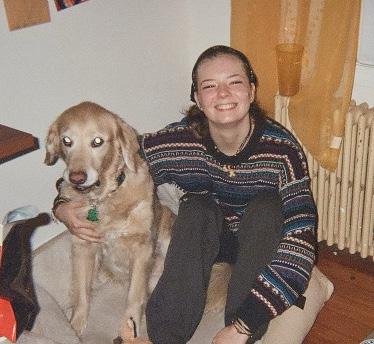
Previously known as Rose, Anna Kladova committed to the Pratt Institute and plans to study art education. She hopes to pursue her BA in drawing and painting.
While she was strongly considering attending the Rhode Island School of Design, Kladova said long-term fnancial constraints were ultimately the deciding factor.
“It's kind of insane to be spending $80,000 on an art degree, especially when I'm going into education. Tat's not really known for making a lot of money,” she said.
Kladova said that she would those who are just beginning the application process to focus on identifying the school that is the best ft for them.
“If a school rejects you, that just means that they aren’t appreciating [your] talents or those talents aren’t too high on their priority list,” she said. “Find a school that really will appreciate you as a student and as a person.”

Jared Wang, previously known as Ben, committed to the Berklee School of Music and plans to study music education.
Wang was also considering studying at the New England Conservatory of Music. He said that while he took a variety of factors into account, consulting diferent students and professors helped him make his decision.
“Tere's quite a bit of overlap between who teaches where, so it's been pretty cool to see how diferent professors view the colleges diferently,” he said.“I was also talking to a bunch of diferent students from both schools about what their experiences are like."
Wang said that he’s looking forward to starting college and seeing what life after high school has to ofer.
“I'm excited to put all the new things that I've learned [from the application process] into action and learn from mistakes that I made this year and do better next year,” he said.
After skyrocketing to success in just two years on the wrestling team, Suvi Talvitie became the first female wrestler to reach the New England's wrestling championship in South's history.
By Olivia WhitakerThis year, senior and wrestling team
superstar Suvi Talvitie became the frst female wrestler from South to reach the New England-wide competition, a record she achieved during the postseason.
Although most high-performing wrestlers begin competing as underclassmen, Talvitie started wrestling during her junior year and skyrocketed to the top of the podium in just two short years.
Before joining the wrestling team, Talvitie spent her winters competing on the alpine ski team as a freshman and the indoor track team as a sophomore, but when she sufered an ankle injury that ended her ski and track careers, she decided to join the wrestling team.
Talvitie said that she joined the wrestling team to further challenge herself in ways that she had been unable to with previous sports.
“Once I couldn't run anymore, that just gave me a big opportunity to really explore something new,” she said. “[Wrestling] seemed like a fun way to try and challenge myself physically but also bring a mental aspect of it because it's like a bit of a chess game.”
Talvitie said that she didn't set expectations for herself when she frst started competing since she started late in her high school career.
“I just wanted to see how good I could get, how far I could go and see if I could improve in something measurable like in competition,” she said. “I also wanted to have fun with it.”
Sophomore Anja Talvitie, Suvi’s sister, said that Suvi uses her experience as a newer wrestler to guide other people who are new
to the sport.
“I think that she provides a lot of support for newer wrestlers,” she said. “It was hard for her to catch up to where she is now, so she knows how to help them improve.”
Assistant wrestling coach Tomi Uyehara said that Talvitie brought a calm and focused presence to the team.
“[Suvi] was very even keeled,” he said. “She could lose a couple matches in a row and just smile and think about what she would do next time.”
Talvitie struggled with injuries during the season and even had to miss a few weeks of practice due to a sprained ankle. She also suffered frequent nosebleeds to the point that one of her matches lasted over 20 minutes – even though the average length of a match is around 9 minutes – because matches aren’t allowed to continue if there’s any blood.
Talvitie said that her nosebleeds often afected her matches and her ability to wrestle.
“A lot of times it was really frustrating,” she said. “I'd be trying to wrestle or really run a move, and I just couldn't because of my nose and I also looked ridiculous, but I sort of learned to deal with it.”
Sophomore Xinqi Zheng, a member of the wrestling team, said that she was surprised that Talvitie was able to bounce back from her injuries so quickly.
“She [sprained] her ankle and she still got a States medal which is just really impressive,” she said. “She just comes right back.”
Before reaching the New England competition, Talvitie battled her way through the
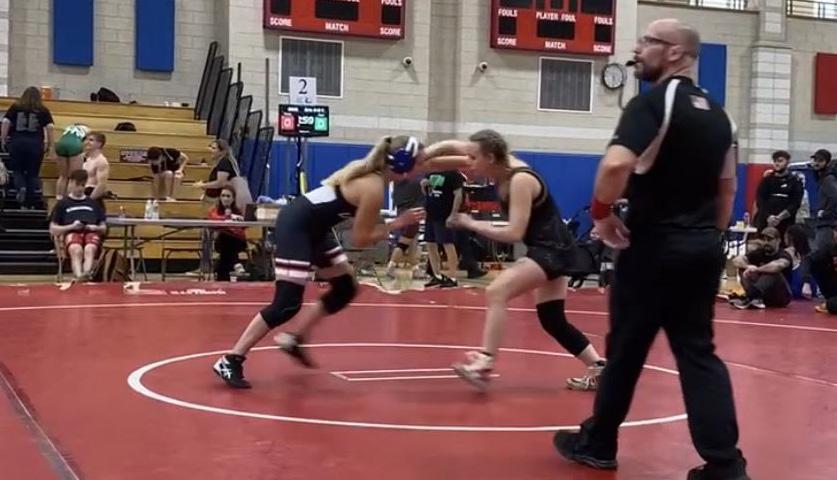

Massachusetts State tournament 138-weight category. Talvitie said that her teammates helped calm her nerves at the States tournament, which ultimately led her to a third-place fnish.
“States was a great time, but leading up to it I was unbelievably nervous,” she said. “Going there to see my teammates wrestling before me and being able to support them made me feel so much calmer.”
Wrestling coach Alan Rotatori said that he was impressed by Talvitie’s mindset and achievements throughout the season.
“I get chills just talking about [Talvitie’s States run] because it's exactly a coach's dream,” he said. “It's a coach's dream to have a kid that is just a great personality anyway, and fun to be around, but very serious and talented.”
Rotatori said that Talvitie’s placing at the New England tournament was a historic instance for both the school and for Talvitie herself.
“It's exciting to be one of the frst female wrestlers to place at the very frst New England
tournament,” he said. “She’ll have that in her back pocket for the rest of her life.”
Uyehara said that Talvitie reaching the placing round at New England’s was especially impressive because she started her wrestling career later than other wrestlers.
“She made it all the way up to the [top six], which was very good considering how new she is,” he said.
Senior wrestler Freya Munshi said that Talvitie’s successful season made important strides for the girls’ wrestling community
“It's a trailblazing moment for girls wrestling in general,” she said. “It's not only good for girls wrestling at South, but also for girls wrestling in Massachusetts.”
Talvitie said that her achievements give her hope that the girls’ wrestling community will continue to grow beyond just her time at South.
“Girls’ wrestling is so new, and it's growing so fast,” she said. “It's really cool to have been on the ground foor of it and have been a part of it.”
As South prepares for the retirement of a beloved coach, teacher and mentor, Alan Rotatori’s legacy will continue to live on in the relationships he cultivated during his 36 years at South.
After graduating from the University of Massachusetts Amherst with a degree in Sports Management, Rotatori settled into a position coaching lacrosse at Amherst High School.
He said that at that point in his career, he never would have anticipated becoming a teacher.
“I felt pretty comfortable with what I was doing [at Amherst] and so I graduated [UMass] in the spring of ‘88 and then immediately got a job at Natick Outdoor store,” he said.“I thought I wanted to go into management.”
However, a couple of chance encounters landed him a position as a high school wrestling coach before he eventually became a lacrosse coach and aide at South.
Rotatori said that these experiences had a signifcant impact on the course of both his career and life.
”From starting as a coach at Amherst High School to becoming a full-time educator, each step was infuenced by encounters and opportunities that seemed to come out of nowhere,” he said.“It wasn’t a straight path, but each twist and turn brought new experiences and lessons. Looking back, I realize how each of those chance meetings played a critical role in shaping my career."
Rotatori has assumed many positions
since his initial hiring at South, from coach to aide to wellness teacher and fnally to that which he holds now as the wellness department head.
Te value of his journey is not lost on him, and he said that he has deep feelings of gratitude for the people he has worked with throughout his career.
"I am a product of so many great people that I have met and that I’ve worked with over
Senior and captain of the wrestling team Freya Munshi is one of many who has received and appreciated these lessons from Rotatori. Munshi said that she has even begun to pass on Rotatori’s advice to new wrestlers, some of whom won’t get the privilege of being coached by him.
"[Rotatori] has all these little anecdotes he's always telling us. One of them that I still
photo by Tayer Bialek
the years,” he said. “Whether it was coaches, teachers or administrators, the most important thing that happened to me in the 36 years has always been the infuence of professionals around me. Tat’s what made me who I am today. Tey’ve taught me so much, and I’ve tried to pass that on to my students and athletes."
use today is that everything is 60 percent mental and 40 percent physical,” she said. “I've taken that phrase to heart and passed it on to younger wrestlers or girls that I'm mentoring."
Rotatori’s impact has extended far past the classroom and the wrestling mat.
For Patrick Jordan-Quern, a wellness
teacher and Rotatori’s successor as wellness department head, Rotatori is more than just a colleague.
Jordan-Quern said that Rotatori has become a close friend and someone he can lean on during a difcult time.
“When I moved into his ofce in 2018, we were able to form a stronger bond because when you have a roommate, you get to know each other outside of just the professional level,” he said. “We've had a lot of ups and downs in our personal lives, and it was just really nice to have somebody that I could confde with. I would treat him like a brother. Tat's how I would compare him."
Similarly, sophomore and future captain of the wrestling team Oliver Weiss said that Rotatori’s many positive qualities are what sets him apart.
"If I had gone to high school with him, I feel like I would be good friends with him,” he said. “He's hardworking, kind and has a sense of humor, which makes me feel supported and able to laugh."
While Rotatori said that while he is incredibly grateful for his time at South, he is looking forward to a completely fresh start in the upcoming chapter of his life.
"I've been working at least 10 hours a day, fve to six days a week for 36 years. I'm okay with getting bored. I’ve been on a constant ‘go’ for so long that the idea of slowing down and maybe even getting bored sounds appealing,” he said.
“It’s a chance to relax, to enjoy the simple things, and to fnd a new rhythm in life. I’ve earned that break, and I’m looking forward to seeing what comes next."
Cooper McFarland & Sidhaan Khanduja sports reporters
Te Unifed Track team is shattering limits by bringing students of all capabilities together.
Trough hard work, dedication and camaraderie, the team has broken barriers and this year has marked a historic season.
2024 marks the frst year that the South Unifed Track team has won sectionals, giving them their frst ever opportunity to compete in states.
Te team combines people with and without disabilities to create a cohesive, fun and welcoming environment.
People on the Unifed Team choose from three running events and three feld events, similar to the track team.
Junior Nat Curtis said that the Unifed
Track team gives students at South with disabilities an enjoyable opportunity that they may not have elsewhere.
“I think [the team] is really good because it helps kids with disabilities be able to participate in such a fun community,” she said.
Head Coach Brian Delesky said that Unifed Track is so special because it gives students that may have previously been excluded a chance to be included in a sport.
“I think [Unifed] is so important because some of these kids haven't been given the opportunity or given some sort of chance to participate,” he said.
Junior Kate Grabowski said that she has had a really positive experience with the team because it has allowed her to form new relationships.
“I'm just always trying to get people to join Unifed Track,” she said. “It's a great way to connect with people.”
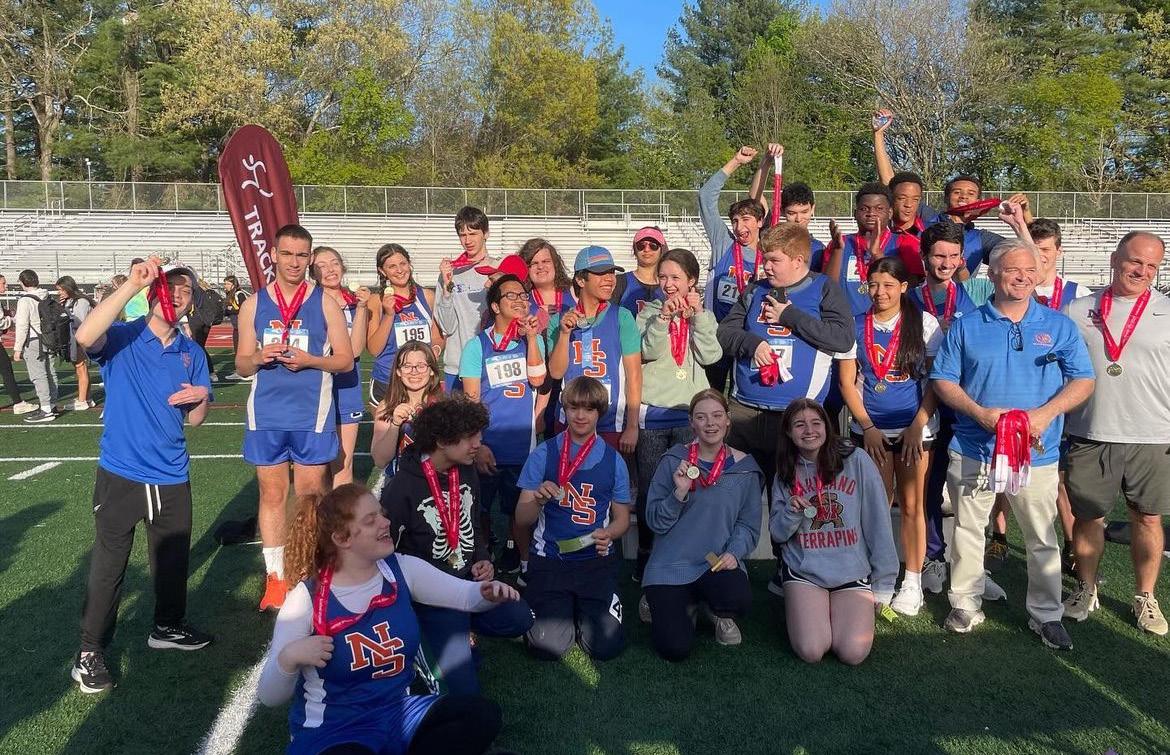 photo by Patricia Gonzalez
photo by Patricia Gonzalez
Similarly, sophomore Rory McGovern said that the team has helped her develop friendships with a wide range of people.
“[Te team] does a nice job bringing together a lot of diferent people and people from diferent grades,” she said.“Within school there's not a lot of mixing but I think sports is a really good way to make friends with diferent people from diferent grades.”
This year, the Unified Track team’s tight-knit community proved successful as they placed frst in sectionals for the frst time in school history.
Sophomore Rebecca Gonzalez said that a large part of the team’s success is the positive environment that they were able to bring to events and practices.
“Everybody loves going to practices and being around each other,” she said. “I think it really comes into play when we're actually running and doing our events.”
While Unifed Track is not often talked about, it’s not all that diferent from other popular spring sports, like baseball and lacrosse.
Deleskey said that Unifed Track is similar to other sports in the sense that the ultimate goal is to show the players how much they’ve developed throughout the season.
“We try to help them recognize the growth they've made, so in that sense, it's really the same,” he said. “It's important because they just see themselves as athletes, and that's what they are; they’re athletes who are competing.”
Delesky also said that similar to the South Track team, the Unifed team follows standard high school rules.
“It’s the same rules, which is what we strive for, that equity,” he said.“Tey get to wear the school colors and participate for the school with each other.”
Unifed Track assistant coach, Kevin
[Te team] does a nice job bringing together a lot of diferent people and people from diferent grades
Rory McGovern class of '24
Flynn, said that he uses the same coaching techniques when coaching members of the Unifed Track team as with other teams that he coaches, such as golf and girls ice hockey.
“As I coach the unifed team, I do the same thing as I coach some other other teams,” he said. “Tey're all athletes, [and] they want to be there, so I think it's important that you coach them like you would coach anybody else.”
Flynn said that the coaches try to push the athletes out of their comfort zones to try to help them learn new things, and make sure they have a good time.
“We try to stress for them to have fun, to work hard [and] to try to do things that maybe they don't feel comfortable doing,” he said.
Gonzalez said that being on the Unifed Track team has taught her not to be afraid to approach people she doesn’t know.
“Don't be afraid to be the frst one to reach out to a person sitting next to you who you might not know very well,” she said. “Tey probably want to form new friendships, so never be afraid to build those bonds and say ‘hi’ to people in the hall.”
Matteo Lee & Mitchell Lookner sports reporters seniors on the roster, fostering collaboration among players
Tis spring, the varsity baseball team battled through the struggles of a long, demanding season as they looked to vault themselves into the postseason tournament.
Despite having only three seniors on the roster after several graduated last year, the Lions remain a competitive team within the tough Dual County League (DCL).
Sophomore and pitcher Luke Leger said that despite the lack of senior players, the team is still able to play at a high level.
“We have a lot of kids that are not seniors but have been on varsity for a decent amount of time,” he said. “We’re young, but we have good experience.”
Sophomore and shortstop Nathan Feldman said that the leadership is much more spread out amongst the team this year due to fewer
It was awesome to see that our team chemistry only got stronger throughout the season, and there was a noticeable diference in our play and confdence
Zach Rhein class of '24
“Instead of having just a few leaders we looked up to like last year, we have to combine our leadership eforts to work as a team more,” Feldman said.
Head coach Paul Williams said that the team’s younger makeup has resulted in a different team identity, marked by a fne-tuned playing style.
Te team two years ago was much older and we had a lot of seniors,” he said.“We were reliant on more power pitching, guys throwing in the mid to high 80s. Tis year we have more fnesse pitching with good movement and curveballs.”
Sophomore and third baseman Dustin Whitaker said that the season has been a bumpy road characterized by lots of high and low points.
“We've been all over the place [this season],” he said. “We’ve had some good games, some bad games [and] some ‘I don’t know what we’re doing’ games.”
Despite the struggles, Williams said the team has recently started to settle into a rhythm , with their pitching being the reliable factor.
“[Te pitching] has given us a shot to beat teams that are all going to be in the tournament; all of our guys have eight plus wins at this point, so we built confdence of that,” he said.
As for the team chemistry, Whitaker said that he feels connected with his teammates and coaches and that he’s enjoyed bonding with the team.
“I like my teammates, and I like that I can have a fun time anytime with my teammates and my coaches,” he said.
photo by Ari Ehrlich
a big factor in his enjoyment of the sport.
“What’s special about the team is that we have amazing coaches and players who love to play with each other,” he said.
Williams said that he is optimistic that the team will win enough games to get into the state tournament.
“We’ve just got to win two out of four to get in the tournament,” he said. “We play some pretty good teams over the next several days, teams that are basically all fghting for the same tournament spots; teams that are in the six to nine win range. When Luke’s pitching we’ve
got a shot to beat anybody.”
Unfortunately, the team heartbreakingly fell short of the tournament this season after a 12-2 loss to Arlington Catholic, fnishing with a record of eight wins and 12 losses.
Despite the team falling short of their expectations this season, senior Zach Rhein said that the overall season was a success that will carry over in to next seasons.
“It was awesome to see that our team's chemistry only got stronger throughout the season, and so we all saw a noticeable diference in our play style and our confdence," he said.
"We all greatly improved as players and had a lot of fun in the process.”
Ever since Germany’s stunning victory over Team USA in last year’s FIBA (International Basketball Federation Association) World Cup, the United States has been planning its revenge on the basketball world.
While last year’s American squad was young and inexperienced, it had practically become a ritual for the United States to pummel their opponents on their way to a gold medal.
Nevertheless, it seems American bas ketball players in the National Basketball Association (NBA) took note of last year’s embarrassment, leading to commitments from some of the NBA’s brightest stars for the upcoming summer Olympics.
Eager to reassert themselves as a basket ball superpower and vault the United States back to the top of the international basketball stage, the Team USA roster is simply loaded. Already, superstars like Anthony Davis, Joel Embiid and Jayson Tatum have committed to play for the 2024 Paris Olympics team. Other star players likeStephen Curry, who is making his frst Olympic basketball appearance in his 15-year-long NBA career, and LeBron James,
Eager to reassert themselves as a basketball superpower and vault the USA back to the international basektball stage, the Team USA roster is loaded.
who is set to embark on his USA basketball farewell tour at 39 years old, are also set to join the roster.
While the 2020 Olympic team had just three players who averaged at least 25 points per game in the prior NBA season, this year’s team consists of seven players who met that mark.
frst added to the games in 1936, coming in frst place sixteen times out of twenty attempts.
However, the FIBA World Cup hasn’t seen this repeated dominance from the United States recently. Tied with Yugoslavia for the most gold medals (both teams have fve), team USA has heavily underperformed at the FIBA World Cup, especially in the last two com-

player. It’s fair to say that the United States has owned the Olympics ever since basketball was
expectations. Perhaps the most notorious example of this dates back to the 2008 Olympics and the birth of the “Redeem Team”: earning
its name simply for the fact that in the prior Summer Olympics, the United States shockingly earned the bronze medal. Tis loss resulted in a ruthless desire for revenge from Team USA, and the NBA’s best players at the time – including LeBron James, Kobe Bryant, Carmelo Anthony and Dwyane Wade – all assembled to form a squad, that successfully lifted American Basketball back on top of the mountaintop of the Olympics.
A group that experienced similarr expectations was the 1992 Men’s Olympic Team, better known as the “Dream Team.” This powerhouse went undefeated in the Olympics that year, recording eight wins and zero losses en route to the gold.
e Dream Team contained eleven hall-of-famers and featured some players who many consider to be the greatest of all time, including Magic Johnson, Larry Bird and of course, Michael Jordan. With an average of 44 points, this team was frankly
e Michael Jordan versus LeBron James debate has been a hot topic among all basketball fans for decades, and if the United States is able to take care of business as usual, yet another accolade will be added to
With more international players than ever entering the NBA and many of the NBA’s top players not being from the United States, the question now becomes whether or not the United States remains the powerhouse they
is upcoming Olympics will be as important as ever for the USA team in order to solidify their spot as the top dog in the world of basketball.

@nshslionsroar posted a poll on Instagram, where 145 of our followers determined the true goats of sports.






From the cross country's nauseating Chocolate Milk Mile to the Booster Club's annual Lion's 5K, running traditions enhance team spirit across South
By Owen HalberstadtWhile many teams have diferent traditions, for the South cross country and track teams, the Lions 5k, bleached hair and having to wear business casual attire to school have been some of the most recognizable.
In a tradition that has been around for decades, top runners from South’s cross country team sport bleached hair before the Dual County League (DCL) Championship each year.
Junior and varsity cross country runner Alex Friedman said that the team bleaching their hair is a tradition that makes the team unique.
“We’re kind of known across the state for [bleaching our hair],” he said. “Not many other teams do that, [so] we’re pretty special about that”
Sophomore and varsity cross country runner Gavin MacDonald said that bleaching his hair makes him feel more connected to his fellow teammates.
“[Bleaching our hair] is to unify us and show that we're all one team,” he said. “We're not individual runners.”
While in the fall South’s cross country team bleaches their hair, sophomore Owen Jung said that in the spring, South’s track team wears formal clothing to look sharp before their meets.
“During the day of a meet, we all dress up nice to be presentable, and professional,” he said.
Meanwhile, the Ocean State Invitational, held annually in Rhode Island, is another
beloved running tradition. Sophomore Cody Herman said that this was his favorite of the team’s customs.
“It’s the most fun thing we do every year,” he said.
Friedman said that the Ocean State Invitational is a great way to show the strength of the team while running in a great environment.
“It is super fun,” he said. “Last year we did particularly well and we got second place overall, which solidifed how strong we were going to be this season.”
Team dinners are also a common tradition among many South teams, especially track and cross country. Once a week, the team gathers at an athlete’s house for a potluck dinner. Jung said that he thinks the team dinners are a great bonding experience for the team.
“I think that team dinners really bring the team together because you're on a team of people you may not talk to as much, so it makes you learn a lot more about them,” he said. “You talk to people you didn't really talk to before, and just makes the team feel more cohesive.”
On May 19, the third annual Lion’s 5k was held at South, marking another major running tradition. Tis fve-kilometer race aimed to raise money for South’s Booster Club, which will pour that money back into South’s athletics and future fundraisers.
Senior and varsity track runner Liam Healey said that the Lion’s 5k is great for runners at South.
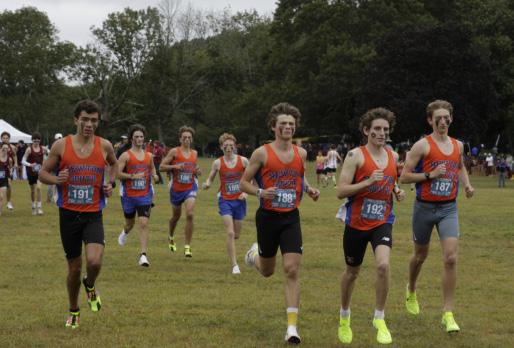
When
everybody is doing our traditions together, you feel a sense of team spirit, and it pushes you in a way to move faster not only for yourself but for your team
Alex Friedman class of '25
“I think it’s really good for the community, getting a lot of sports teams to come together and run,” he said.
Amidst the Lion’s 5k success, co-president of the Booster Club Teri Ginsburg said that she is hopeful it continues to run in the future.
“Tis is our third year doing this, and we have been able to raise about $30,000 each time we’ve done it,” she said. “We really hope it continues to be a great tradition at South, it’s an awesome community and really hope that people continue to carry it forward.”
Ginsburg also said that the event was run with the intention of not only having a fundraiser, but also a communal aspect to go along with it.
“We chose to organize this event because we wanted to have a fundraiser that was also a community builder,” she said. “We wanted the people to have the double impact of coming out and having a good time, as well as raising funds.”
One of the largest, grossest and weirdly festive traditions the Track team puts on is the chocolate milk mile. Friedman said that although it can be nasty for some people, he personally enjoys it.
“It's a Christmas tradition we usually do, and you pound a cup of chocolate milk every quarter mile,” he said. “Some people throw up, but it's a lot of fun. I hope to continue the tradition because it's one of my favorites.”
Friedman said that all of these running traditions have had a positive impact on the running community, and the team’s bond.
“When everybody is doing our traditions together, you feel a sense of team spirit, and it pushes you in a way to move faster not only for yourself but for your team,” he said.


This puzzle is best enjoyed sunbathing in the dandelion-filled grass of the courtyard with the crisp water of a working water fountain

1) Beloved wellness department head and wrestling coach
3) Incoming class: 202_
4) What do you call a cat that’s eaten a lemon?
7) Moving feature of a grad cap
8) Dean or where you deposit your checks
13) 2nd and 3rd numbers of the fbonacci sequence
14) Verdict for all 34 charges in Trump’s NY criminal trial


2) Outgoing class: 202_
4) First female South wrestler to make the podium at New England Championships
5) “Say you can't sleep, baby, I know. Tat's that me…”
6) Cross country runners’ favorite milk (especially for a mile around the track)
9) Vehicle of choice for many playing Senior Assassins
10) Name of our Chinese sister school in Beijing
11) Challengers sport
12) North-South joint robotics team
15) Pulitzer prize winning Humble rapper
Editor-inChiefs'







Clairo
"I'm so happy that Clairo's back from her hiatus" - Grace
f you’re reading this, you have probably fallen into deep despair. It’s more than halfway through quarter 4 and only now are you realizing that you probably should have locked in earlier.

Luke Combs
"I'm addicted to country. My friends might stage an intervention" - Risha
still got a whole ⅛ left in the school year! By listening to a couple of these tips, I promise you that you will make the single greatest academic comeback in South history.



You’ve been half-assing it all year, and it certainly shows on your grades. You’ve somehow received a letter grade that is farther down the alphabet than “F”.
People aren’t happy with you. Your teachers are on your case, your parents are your case, the feds are on your case, and you’ve become the laughing stock of the friend group.
I know you’re very close to giving up and moving out of the country, but what if I told you that things aren't over just yet? You’ve
Now, the frst step in really pulling this thing of is glazing your teacher. If you’re unfamiliar with the art, glazing is the act of sucking up to a teacher. You’ve really gotta suck hard, though.
Tis can be achieved by frequently raising your hand, complimenting them, and staying after class to chat. Te most successful of the successful students, the cream of the crop, have mastered this art.
Who knows, maybe then your teacher will ignore your failing test grades, missing
assignments and lack of participation in the frst 3 quarters and give you an ‘A’. If that doesn’t work, the second thing you’re going to want to do is try a little bit of bargaining. You can negotiate them moving your grade up by 10% for a large sum of money.
Another tip, you should probably stop copying of the kid who picks his nose and watches youtube shorts in the back of the class. He’s probably the main reason you're in this whole mess in the frst place.
All these tips are efective ways of successfully making a last second academic comeback but at the end of the day, you could always just study and put the time and efort into your school work.
Aquarius (Jan. 20-Feb. 18):
Most likely to change the world but never change their socks
Pisces (Feb. 19-March 20): Most
never win an Oscar
Virgo (Aug. 23- Sept. 22): Most likely to cure cancer, but it'll be partially as an accident?
Libra (Sept. 23- Oct. 22):
Most likely to win a beauty pageant with crawling fast as their special talent
Scorpio (Oct. 23- Nov. 21):
Most likely to solve a murder mystery with a middle aged Adam Sandler
Sagittarius (Nov. 22- Dec. 21):
Most likely to climb Mount Everest but slip down the other side
Capricorn (Dec. 22- Jan. 19):
Most likely to be your boss — Te Ofce's Michael Scott-style